#this goes out to all yous writing western themed fan fictions
Text
In case any of you were wondering, cacti can and do sway in the wind 🌵
#seems like they shouldn't but they do#this goes out to all yous writing western themed fan fictions#cactus#desert#santa fe#jack kelly#newsies#cowboy
4 notes
·
View notes
Text

Hello! I'm Carmen. A 33 year-old queer writer known as gaslight on AO3. You will find original and fan works (Red Dead Redemption, my beloved) here. I write historical fiction, westerns, noirs, and mysteries and reblog related content plus classic film and video game posts. I am tag/ask game friendly, read across all genres, and would love to hear about your WIP!
—— Style: Non-linear, 3rd person past tense, playing with genre conventions, relentless and deeply troubled characters, humor and action to balance out dark themes, and trying to make the reader feel like they are watching a movie.
—— Tropes: Mutual Pining, Power of Friendship, Anti-Heroes, Found Family, Roaring Rampage of Revenge, Black-and-Gray Morality, Two Mysteries One Story, Organized Crime, "Retired" Bad Ass, Battle Couple, Disaster Bisexuals

Works in Progress

Blackwater - John Marston hires Private Detective Arthur Morgan to look into the death of Heidi McCourt, a friend who he suspects was the victim of foul play rather than suicide. His investigation leads them into the escalating war over West Elizabeth’s bootlegging industry between two powerful gangsters Arthur happens to have unpleasant and unfinished history with.
—— Status: 60% done Chapter 32 | Chapter 31 posted Nov. 2023
—— Links: Read on AO3 | Intro | Excerpts | Tag | Inspiration | Fan Art

Hell's Half Acre (When Sins Haunt Prequel) - When death comes to Fort Worth and strikes her new circle of friends, Charlotte O’Shea resolves to hunt down the culprit before they kill again. Murder isn’t the only mystery in the air however. Sam and Thomas Quinn, father-and-son ex-cowboys who happen to be her colleagues and partners-in-crime-solving, are determined to uncover what made the socialite run away from New York and why she is no stranger to firearms.
—— Status: Outlining
—— Links: Tag | Backstory Drabbles → Education | Rivals | Love

When Sins Haunt - When Warren Howard destroys her life again, Charlotte O'Shea goes after the outlaw and his vicious Cobalt Gang. Jack Cadwell, an old friend, crosses Charlotte's warpath when the journalist flees the wrath of a New York crime boss. To survive they must stay a step ahead of their growing list of enemies as Charlotte blazes a trail of vengeance across the American West.
—— Status: Second Draft (On Hold)
—— Links: Intro | Side Characters | Tag | Update

Completed Works

Brothers (Pre-Canon AU) - Arthur struggles with the responsibility of being an older brother, particularly being looked up to, as his own actions cut away at his soul and his self-worth continues to erode. He teaches John different things along the way and strives to protect him from harm. This is easier said than done, as is Arthur's desire to prevent the kid from becoming like him. [ x ]
Among the Smoke and the Stars (Epilogue AU) - Most days the urge to run and roam coursed hot under his skin but maybe Beecher’s Hope would change that. Determined to pay off the loan for his new home, John heads to Gaptooth Breach in search of the sixty-five dollars on Esteban Cortez’s head. The thing is John isn't the only one after that bounty. [ x ]

Image Sources
Sunset Clouds - Dewang Gupta (Unsplash)
Blackwater Banner - rollawayyourbones
When Sins Haunt Banner - Sweetwater (2013)
Untitled Banner - Original Picture by Susan Fox
Red Dead Banner - Rockstar Games
Divider - @evansyhelp
If you have read this far, thank you! Please feel free to ask any questions or tell me about what you are working on. :)
#writeblr#writeblr community#writeblr intro#writeblr introduction#writeblrcafe#writeblrgarden#writing blog#writers of tumblr#writers on tumblr#amwriting#wip directory#writing community#Hell's Half Acre
31 notes
·
View notes
Note
So I'm here to say that I really love your Bingyuan fic! The research you do for it and share with us is just amazing! I also have a q regarding LBG. From SV we know that he felt admiration for his Shizun so do you think that if SJ wasn't cruel to him LBG's admiration would've grown into love and attraction like it did in LBH's case for SY? Which then also raises a question: would LBH/LBG fall in love with any Shizun who was kind to him? Or was he just drawn to SJ's type of personality. WDYT?
Hi there, Anon! I’m glad you’re liking the Untold Tale! Thanks for reading! I think it lowkey helps when the story I’m writing (in general) is from a culture I’m familiar with and that I know some of its language nuances (just general Mainland dialect; I’m unfamiliar with Shanghainese, the Beijing dialect, etc etc). So fortunately for me, as someone who is Chinese but was born in the Western side of the world speaking Mandarin to family and friends, emulating the Chinese aesthetic and atmosphere in TUT comes a little bit easier to me than someone who did not grow up with this culture. I bet if I had been raised in China, I would be able to write something even more multilayered and deep but, alas, the youthful rebellious me of the past hadn’t taken my pinyin and Chinese character writing lessons seriously so I can only communicate verbally and understand audibly 😫. It’s very special for us writers in fandoms to be able to write a story of a culture that we actually know and can identify with. But high key it’s been immensely fun injecting some references of things I’ve come to notice from watching period C-dramas and the C-novels I’ve read, and I’ve come to learn interesting things about Chinese history and mythology even I didn’t know! So the story really writes itself.
Shen Jiu (OG!Shen Qingqiu)
To answer your question 🤔, to be honest this is why the SVSSS fandom is great—because there’s so many interpretations of the original source material. That’s why we have our headcanons and fanfictions to explore these many different possibilities. So for me personally, I can see it happening both ways: *1) LBG does develop a crush/falls in love with SJ, or 2) no matter how SJ treats him LBG regards him respectfully or coldly. I think Possibility 1 is more likely, since SY transmigrated into SQQ and we saw what happened with “Bunhe.”
Now, mind, for Possibility 1 to be more likely to happen, the SJ in PIDW will have to undergo a massive personality change/ a change of heart/ develop a good conscience and will need to clean up his image aka clear up the massive misunderstandings from PIDW canon (like him being mistaken as a pervert for Ning Yingying, visiting whorehouses, killing LQG, etc). It’ll be difficult though considering who Airplane has changed SJ into for his stallion harem novel (reading through SVSSS, my impression of PIDW besides it being the harem stallion novel is that it sounds similar to a “dog blood plot,” where audiences tune in to see how the villains are brought to justice). I literally have a line from TUT in a future chapter where SY says this about SJ since I will resurrect SJ and bring him into the story for closure:
People like Shen Qingqiu naturally had a set of deeply-rooted values. If one wanted to change them, it’d be easier to just have them reincarnate. (—TUT, ch???)
At his core, he’s a flawed man (which makes sense with the underlying cycle of abuse theory, considering his upbringing and backstory). He’s jealous and petty and prickly. His image is that of a proud and cold immortal. In Chinese terms, he’s the type of character archtype who I can see being àojiāo (definitely not canon characterization; this is just a stray thought that amuses me) in a romantic relationship.

LBH will have to recognize that^, or be in a position where he finds SJ’s caustic side endearing instead. He will also have to be extremely patient with him (although, since the joke in SVSSS is that LBH is an incurable M, it shouldn’t be that hard).
A fun thing about OG!SQQ is that he’s the cannon fodder scumbag villain of PIDW. He’s the reason LBG blackened from a white lotus. And, as you know, villains aka antagonists aka bad boys resonate strongly with people for a reason. That’s why we see a lot of Enemies to Lovers tropes, etc. It squicks me to use this phrase but “the allure of dating a ‘bad boy’ is strong.” SJ is that type of bad boy we could identify as a “fixer-upper project” (ugh, that phrase)—even with the red flags and warning signs—especially for those said to have a troubled past with rejecting neglectful parental figures/ family members/ friends and have have not outgrown their wish to convert that sort of person into a loving, accepting person. When we want something we can’t or shouldn’t have, our desire for it grows exponentially. In fanfiction this is a concept writers and readers can explore safely in a world of the imaginary.
From a Meta Perspective
Although, if we look at it meta-ly, the cold and proud and/or knowledgeable Shizun (teacher/ master) character who comes to know love and “is redeemed” by whomever is the love interest (typically a cute and quirky girl who may or may not have started off as naive to the innerworkings of the Cultivation World and therefore needs an established and mature mentor to guide them) is a very well-known archetype for a reason in Chinese fan culture.
Seeing a terrible person change their ways and try to become a better person because of the influence of the one they love is also a popular depiction for a reason.
It’s almost like gap moe. The crueler and aloof one starts out as (arrogance is a staple), the more impactful the shift is when we see such characters soften their edges.
The draw of the sacred master/disciple relationship is that it’s taboo, so I think it’s fair to say that such a relationship in fiction is a popular trope precisely because of this aspect. From a writer’s perspective, the main appeal is to show that there is someone out there who can cause this respectful figure to lose control (undergo emotional change) and go to great lengths to protect his/her precious person. That precious person also has to fall into the “not like other girls” trope (so they can show the ML a different world he would not have seen the beauty of before). On the other side, we look forward to the point of the story where the love interest has their “Oh” moment and realizes their admiration has somehow shifted into love and attraction over the course of events.
Other Romantic Possibilities
It’s very likely. I personally like the fanon headcanon where anyone with Heavenly Demon blood running through their veins feels a compulsion to “obsessively fixate on one person” (TLJ —> SXY, LBH —> SQQ). Personally I don’t recall if this was canon or fanon, but someone had written something about LBH imprinting on one person in his lifetime on the account of his demon nature. And I like that theory (I think it’s likely more fanon than anything but it’s an intriguing idea full of possibilities!).
For him to fixate romantically on one person, I personally don’t think the prerequisite is just by being kind to LBH (but it probably adds to the person’s appeal). There’s probably other factors that go into this to capture the male protagonist’s eye, such as him finding someone attractive (or passes his own personal standards) and/or having good chemistry with that person. So I could see him being into other Shizuns and whomever else. Personally I also think there is appeal in the unobtainable. It’s one thing to have someone’s affection (see LBG and his harem of 600 wives who definitely aren’t shy about giving him affection), but it’s another to know you’ve earned the affections of someone you really like and respect (especially if it’s someone thought to be unobtainable).
As long as the writer can provide a plausible justification for me to suspend disbelief and they set up events to justify it, I can swallow just about any ship possibility. It doesn’t necessarily have to be SJ’s type of personality. (For example, I read a very good fanfiction before where the writer paired Luo Binghe with Ming Fan. Ming Fan, people!!! And they actually pulled it off! What a madlad! Mind, it’s Shen Yuan who had transmigrated into MF in that premise, but the writer set up events that showed how these two characters came to bond and develop a deep friendship which inevitably had LBH developing a crush on his shixiong. I use this as an example because this is the type of unexpected (crack)ship, but because the writer did their work trying to make it seem plausible, we can only admire their hard work and effort at pulling it off.)
As the saying goes, there are plenty of fishes in the sea! As the protagonist, LBH/LBG can have many OTP possibilities with just about anyone as long as the writer can make it plausible. It’s all about the character development and the story/ central themes they wish to tell with the ship!
(Note, these really aren’t hot takes, lol. I’m just having fun answering to this casually from the perspective of a writer. Thank you for your Ask, anon!)

#svsss#shen jiu#shen qingqiu#bingqiu#bingjiu#ask#anon#answered#replied#the untold tale#lowkey I like villainous SJ than misunderstood uwu SJ#because let evil ppl be evil#he did terrible things and he has to own up to it even if he had a tragic backstory#I say all this but I like SJ lol don’t get me wrong#I see a lot of romantic possibilities and not just one for LBH/LBG#and this is a direct cause of me being a writer#I just see a lot of possibilities#and I happen to favor what I favor#but I do see other possibilities#thank you for the ask Anon!#phoenix talks
97 notes
·
View notes
Text
Phoenix Mountain Kiss and Consent/Boundaries in MDZS
The following opinion, expressed in the recent mdzs controversial opinion thread on twitter, is actually one I’ve meant to address for a while:
Even if most of fans loves the 'stolen kiss scene' in the Phoenix Mountain in the novel, that was a sexual harassment.
People in the fandom, especially those who were introduced first to the novel through cql, have a tendency to criticize the Phoenix Mountain kiss scene, saying it was non-consensual. My problem is not that they are wrong. The kiss is (or starts as, at the very least) non-consensual. My problem with this criticism is that people point this out as if it were a mistake. As if mxtx had meant to write a romantic kiss and had instead fumbled it all up and made it not consensual by virtue of not being woke, not being a good enough writer, or being too influenced by bl tropes. And that readers are too unsuspecting or not educated enough to realize the wrong mxtx committed.
Here’s my hot take: The kiss is non-consensual because it was written to be non-consensual. mxtx is not trying to pull the wool over our eyes. The reason why we, as readers, can infer that, is because the non-consensual aspects of the kiss are important to the events of the plot, some of themes explored in the book, lwj and wwx’s relationship after wwx’s return, and lwj’s character arc. mxtx uses this moment and its aftermaths, amongst others, to make a point about consent and communication in relationships--one of the central themes of the novel. Shocking, I know. Arguing that consent and communication are a main theme in mdsz: now that's a controversial opinion.
Now, I won’t argue mxtx always manages to develop this theme with utmost finesse. You can critique and disagree with her treatment of the theme throughout the novel (taking into consideration, as well, how it’s not just explored through lwj and wwx’s relationship). That being said, isolating events in the novel like the Phoenix kiss scene to mark them as Good or Bad without considering the context in which they happen and are explored within the novel is just bad literary analysis :/.
Let’s first consider this simple statement: the non-consensual aspect of the kiss is not accidental--mxtx knew it was non-consensual when she wrote it, and she wasn’t trying to hide that fact.
By the time we reach the Phoenix Mountain competition, lwj has accepted his feelings for wwx, and that these feelings will not be returned. After all, in the xuanwu cave, wwx took great pains to ‘reassure’ him that he is super-straight-and-totally-would-never-flirt-with-him. Yet, wwx continues to ‘flirt’ with him--tossing a flower at him just before the competition--which we can gather is a source of, um, great torment for him.
We are not privy to lwj’s thought process leading to the stolen kiss. What we know for certain, however, is how he reacts to and perceives his own actions after the fact. Through wwx’s unreliable narration, we can still understand that lwj immediately regrets his actions and feels uncontrollable anger towards himself and his lack of self-restraint. While wwx has more complicated and contradictory feelings bout the kiss, lwj clearly sees his actions as wrong and disrespectful. He is scared of what he has been capable of doing unto another person--pushing wwx away the moment he sees him after the kiss.
The person spun around. It was Lan Wangji after all. However, right now, his eyes were bloodshot, his expression almost frightening. Wei Wuxian was startled, “Wow, so scary.”
Lan Wangji’s voice was harsh, “Go!”
Wei Wuxian, “I just came here and you want me to go. Do you really hate me that much?”
Lan Wangji, “Stay away from me!” [chapter 69]
As readers, we are told that the Phoenix Mountain kiss, nor its implications, is not something to consider lightly. The fact that lwj’s reaction after the kiss is written in, and that it is so intense for someone usually so reserved, or the fact that we learn that more than a decade later he is still ashamed of himself and describe himself as having done something wrong (or, very wrong 很不对 ), all prove that the non-consensual aspect of the kiss is not an accident and is not downplayed as something to expect from someone in love with another person.
蓝忘机闷声道:“我,那时,自知不对。很不对。” [chapter 111]
I can already hear some people ask: even if it was not an accident, why chose to include a non-consensual kiss between the two romantic leads? if not because it is a bl trope/weird kink, why did mxtx chose to put this in her novel? what do we gain by including dubious consent or non-consensual interactions in our fiction?
The long-short answer is: because the act of crossing boundaries is a very productive story-telling device for any piece of media focusing on any type of interpersonal relationships. Crossing boundaries--willfully or unintentionally--is a source of conflict, internal and/or relational, which can drive the plot forward, shape character development and relationships, as well as be useful for certain thematic discussions.
Current discourses regarding consent in English-speaking, mostly-western spheres of the web tend to be very polarized, painting people who cross boundaries as bad. The solution presented (i.e. how to not be a bad person) tends to be an invitation for everyone, within any relationship, to constantly negotiate consent verbally and honestly: to constantly disclose boundaries, to constantly ask for permission, etc. While I do not dismiss the value of these suggestions, it is an ideal representative of certain socio-temporally specific cultural expectations of what communication is, how communication should happen, and how relationships should be like, etc.. Human relationships are messy, people are flawed and hurt each other, and we have complex internal lives (for instance, someone might not realize their wants or limits until they are faced with them). Instead of having media show us only a specific type of idealized relationships where boundaries are never crossed, ever, they allow us to explore the implications of boundaries within interpersonal relationships. Or, sometimes, media and fiction just aim to represent or are influenced by this very real part of human relationships, and use it as a way to create conflict within the narrative and relationships (sometimes in a interesting manner, sometimes in a very gross manner).
In mdsz, the Phoenix mountain non-consensual kiss is a two-fold source of conflict: internal (lwj) and relational. While wwx remains unaware until he and lwj are together of the identity of the person who kissed him, the implications of the kiss ends up shaping their relationship both before and after wwx’s rebirth.
A source of (unknown) conflict between lwj and wwx after he is summoned back from the dead is the fact that lwj believes wwx is aware of his feelings. But this conflict is further compounded by the fact that lwj has once forced his feelings unto wwx, and is utterly afraid that he would dare to ever do it again. That is why, every time wwx initiates physical contact, or flirts very deliberately with lwj, lwj never goes further than what wwx has initiated. Sometimes, he even de-escalates their proximity or level of intimacy (usually by asking wwx to “ 别乱动” or, famously during Drunk#2, by literally knocking himself out) --out of fear that he, again, would lack self-control and do something wrong to the man he loved. He never presumes he has the permission to push their relationship further than what wwx is offering. Without that added source of conflict, would it have been reasonable to expect lwj and wwx to have realized their mutual feelings earlier, even with the issue of lwj not being aware wwx does not know of his feelings?
“In the beginning, the reason for behaving in such a manner was to let Lan Wangji be disgusted with him and kick him out of the Cloud Recesses, and they would never have to meet again, going their separate ways. Lan Wangji couldn’t possibly tell what his real intentions were. Yet, [..] even when faced with Wei Wuxian’s various actions, tricks, and pranks, Lan Wangji never once lost his temper, reciprocating with restraint and courtesy.” [chapter 99]
That is all true, of course, until Drunk 3. Here again, the ghost of the stolen kiss plays a part in accentuating the conflict. Without it, would lwj have jumped to conclusions as quickly? And, plot-wise, the shared perception of wwx and lwj that they have taken advantage of the other is a source of conflict that does multiple things--it gives wwx an incentive to go look at the temple at night to distract himself from his guilt and sadness, instead of going the next day with lwj (at which point jgy would have had perhaps already left) and it keeps wwx in the dark about lwj’s feelings until lxc reveals to him the events of the past he has forgotten. Here again, issues of consent are clearly taken into consideration as a source of conflict, shaping both characters’ motivations and the events of the plot.
Finally, the theme of consent/boundaries is an important aspect of lwj’s internal struggle, particularly in relation to his father’s choices. The kiss is part of his journey.
It is not coincidental that the Lan motto is “Be Honorable”/”Self-restraint,” and that lwj is presented as the model Lan disciple. This element is part of the context that gives narrative and thematic meaning to the non-consensual kiss. When lwj forces a kiss on a blindfolded wwx, lwj goes against the values he holds dear and the teachings that were imparted unto him--prime internal conflict.
But what is also interesting, to me in any case, is how consent is the thing that ultimately differentiates lwj’s choices from his father’s.
How willing was Lan-furen to be saved by Qingheng-jun? to be taken to live in seclusion in the Cloud Recesses? to be married to him? to have children with him? The novel never tells us clearly. However, the novel gives us an idea of how lqr, lxc and lwj perceive their parents’ relationship. For lwj, we are given an insight into his perception indirectly during the following conversation between him and lxc.
[Lan Xichen] spoke, “Wangji, is there something on your mind? Why have you been so tense?”
Of course, in most people’s eyes, the ‘tenseness’ probably looked no different than Lan Wangji’s other expressions.
Lan Wangji’s brows sunk low as he shook his head. A few moments later, he replied in a low voice, “Brother, I want to take someone back to the Cloud Recesses.”
Lan Xichen was surprised. “Take someone back to the Cloud Recesses?”
Lan Wangji nodded, his expression pensive. After a pause, he continued, “Take them back… and hide them somewhere.”
Lan Xichen’s eyes immediately widened.
[…]
“Hide them somewhere?”
Lan Wangji frowned softly. “But they are not willing.” [chapter 72]
Indirectly, we come to understand that lwj draws parallels with his father situation: they both want to protect someone by taking them to the Cloud Recesses, but these persons are unwilling. The unsaid question here is, would I choose to do as our father did?
The non-consensual kiss is part of lwj’s journey, through which he comes to understand that, despite his strict upbringing and disciplined lifestyle that was supposed to keep him from becoming like his father, he is capable of being his father (or at least who he thinks his father is). He learns that he can understand what sort of passionate feelings could bring someone to do something that goes against not only the wishes of his clan members, but the very wishes of the person they love, for the sake of keeping them safe or for the sake of having them by their sides. And at the end of that internal journey, lwj chooses not be like his father--to put wwx’s decisions and wants and needs first. After buyetian, lwj offers his protection and confesses his feelings--and wwx rejects him. lwj respects wwx’s choice, while still going against his clan to protect him. He brings wwx back to Mass Grave Hill knowing full well that wwx would not survive long the wrath of the four great sects seeking revenge against him, and goes home to receive his punishment.
Overall, what I tried to say in many many words, is that the Phoenix Mountain kiss is not non-consensual by accident. It is not because mxtx is an awful person or is not educated enough, or because she thinks dubious consent is romantic. The fact that it is non-consensual is addressed within the narrative, fuels internal and external conflicts, and is as well woven into the plot structure and the themes of the novel. The kiss is not an outlier element, added to titillate a readership--it exists as an integral part of the novel.
I’m not saying it’s not okay to decide that you do not want to engage with any content that includes non-consensual interactions or dubious consent because that triggers or irks you regardless of the way it is handled. It is totally valid to not personally enjoy or have criticisms about choices mxtx made in exploring these themes, in presenting the internal and relational conflicts around consent/boundaries, or even in the way she decided to write the scenes that figure dubious consent. However, it is not really helpful to divorce an event from its context within a piece of media in order to brand it as either Problematic or Unproblematic, Good or Bad.
Note: Much more could be said about the theme of consent/boundaries in mdzs; this is not exhaustive in the least.
Note2: Much more could be said, in relation to the question and theme of consent, about: the cultural limitations of Westerners to engage fully with a text written for a chinese audience; the limits of fan translators to fully understand the nuances and themes of a novel and to communicate them in a different language; about the place dubious consent and non-consensual interactions has had in the romance/erotica genre for a long time, and no, not only because Misogyny or Homophobia.
#re: controversial mdzs opinion twitter thread#mdzs#mdzs meta#excuse my english lmao#wangxian#this is 2k i'm sorry
1K notes
·
View notes
Note
I forget if you've been asked this question before, but a friend of mine is trying to write a kaiju story for kaijune, but she doesn't have much experience writing kaiju or with kaiju media, and she asked me a question I figured you'd be better at answering: What is it that makes a kaiju story truly feel like a kaiju story other than the focus on a giant monster?
That's a very difficult question to answer, so I can see why she's having problems with it. It all depends on how you define the kaiju genre, and that's a highly contentious subject. I mean, defining things always is - every definition will have people who say it's too loose for including x and other people saying it's too narrow for excluding y, and definitions of the "kaiju genre" are no exception.
I guess let's start by setting up the to extreme ends of this definition.
The most liberal definition: A Kaiju Story is any story where a giant monster/kaiju rampaging around is the central conflict of the story.
The most(?) conservative definition: A Kaiju Story is any Japanese story where a kaiju rampaging is the central conflict of the story.
Our first big takeaway here, and the thing all kaiju genre fans can agree on, is that a kaiju needs to be integral to the plot of your kaiju story. Lord of the Rings isn't a kaiju story, because while it has a big monster in it, that big monster is an incidental encounter rather than the core focus of the conflict. That's our minimum requirement for a kaiju story.
Now, I lean towards the liberal side of this issue (which is unusual for me when it comes to defining literary shit), but I'm gonna explore on the conservative side here first, because I think there's some important points to consider there. The term "kaiju" doesn't just conjure up images of any giant monster when you hear it - it brings to mind Godzilla, Power Rangers, Gamera, Ultraman, men in rubber suits, bad dubbing, etc. And what those franchises have in common that other giant monster media doesn't is a shared background in Japanese culture and history.
When I think about why I love kaiju stories even more than most other monster-focused fiction, a lot of the things that come to mind have their roots in Japanese culture. The complex characterization of the monsters has its roots in Shintoism and various folk religious that treat all things, be they human, animal, plant, or even inanimate objects, as having souls. The emphasis on living in harmony with nature comes from those same beliefs, from Buddhism, and from the mercurial nature of Japan's environment and weather. The firm themes of opposing warfare and breaking cycles of violence are born from the pioneers of the genre despising the horrors they witnessed in World War II and wanting future generations to never repeat that great mistake. Et cetera et cetera.
I think it would be mostly accurate to say there are a great many details that make Japanese giant monster stories feel more alike to each other than to non-Japanese giant monster movies. ...mostly.
But not entirely.
Because defining "the kaiju genre" as solely being a product of Japanese culture ignores the unignorable fact that Japanese kaiju movies, from the very beginning, took some inspiration from American giant monster films. There are elements of King Kong (1933) in Godzilla (1954), and the film-makers have acknowledged that much. Rodan has this great twist at the end of the first act that depends on the audience expecting it to work like an American giant bug movie, which most of the first act functions almost identical to. The movie that cemented the "Monster vs. Monster" formula at Toho was King Kong vs. Godzilla. It goes on!
And it also goes both ways - Gorgo, a film made by the creators of The Beast from 20,000 Fathoms and The Giant Behemoth, has more in common with the Godzilla franchise in tone, themes, and its approach to its monstrous stars than it does to its Western predecessors, and the creators were open about it. Hell, they even work in explicit nods to it in the film - the island Gorgo is discovered on is called Nara Island, a Japanese name despite the island itself being off the coast of Ireland. Pacific Rim, Colossal, and Cloverfield, some of the most prominent modern American giant monster movies, were likewise explicitly inspired by Japanese giant monster films. Video games like Rampage and War of the Monsters draw influence from and make homages to monster films of both the East and West.
There's also a sort of inherent fallacy to assume all kaiju stories from Japan end up having the same themes and motifs. I don't think the Showa Godzilla films would agree with how, say, Attack on Titan portrays war. Japanese giant monster stories aren't a monolith.
If a Japanese giant monster story has content that unilaterally contradicts the content of a classic kaiju work like Godzilla, but an American giant monster movie hews to that content very closely, which is the true kaiju story? Is being made by Japanese people all that matters? Or is it the content - the themes, the tone, the approach to the monster, etc.? Where do we draw the line?
...I don't know, dude, and I don't think it's my place to be the arbiter of that.
But, in an attempt to give you something that could be vaguely helpful, here is my short list of criteria for a kaiju story that I personally would like, which isn't quite the same thing as "what makes a kaiju story a kaiju story," but is as close as you're gonna get to that when asking me:
1. The monster(s) is a character and has at least one moment of sympathy in the narrative.
2. The dichotomy of nature and civilization is at the crux of the narrative. Neither is presented as uniformly good or evil - civilization has started the conflict by causing wanton and unnecessary destruction, and nature strikes back at civilization unilaterally without distinguishing the guilty from the innocent.
3. The rampaging monster(s) is a direct consequence of civilization fucking things up - bombs waking up prehistoric monsters, greedy CEOs steal a monster's egg to make a profit without a care for what the parent may do to get it back, genetic engineering creating deadly mutants, aliens who represent the dark potential future of humanity if we keep going down a selfish, warlike path set loose monsters as their personal soldiers, etc.
4. The story is explicitly anti-war, anti-capitalist, and pro-environmentalism.
5. Conventional weaponry is incapable of defeating the monsters.
6. No matter how things shake out, humanity is humbled by their encounter with the monsters, and either learns to do better or suffers for their hubris and arrogant desire to dominate the world.
34 notes
·
View notes
Text
A meta and analysis on Hurricane Touchdown
Hurricane Touchdown sure is one of the Digimon entries that’s really difficult to describe. Often said to be “confusing” and “like an acid trip” (for pretty good reason, honestly), it somehow also manages to have a lot of hold in public memory, partially due to being one of the three movies that got widespread international distribution via Digimon: The Movie. Moreover, its relevance has started to re-emerge thanks to Kizuna, the director of which has stated Hurricane Touchdown to be his favorite movie (multiple times). Rather recently, there was even an editorial written by a journalist who had been covering Kizuna, professing that he had watched Hurricane Touchdown as a kid and hated it, only to rewatch it as an adult and appreciate it much better.
With all that, plus the fact that the movie recently got a new translation, it’s probably a good time to go back over the movie and analyze it! Despite what popular sentiment may have you believe, the plot of the movie isn’t that fundamentally incomprehensible, just buried under some rather unusual production and execution decisions. But there’s a lot to be said about the themes and story of the movie, so let’s dig in!
(All screenshots and quotations from the movie are based off the Hudie translation.)
Hurricane Touchdown in meta franchise terms
The full title of the movie isn’t technically Hurricane Touchdown by itself, but rather “Digimon Hurricane Touchdown!!/Transcendent Evolution!! The Golden Digimentals”. (The Japanese fanbase tends to shorten it to “Digimon Hurricane”, or, for even more shortening, “dejihari”.) The double-titling there is because of how it was originally screened; it was the 02 “summer movie”, screening in July (between the airings of 02 episodes 14 and 15). Functionally, the franchise has thereafter treated it like a single movie, but at the time, the fact it was technically “two” movies gave it the longest running time of any Digimon theatrical movie, clocking in at a little over an hour. (The tri. movies are officially considered OVAs and not theatrical movies due to their limited-screening nature, so as of this writing Kizuna, at 95 minutes, is the only theatrical movie to break this record.)
The movie itself has a pretty fascinating development history – for one, Akiyama Ryou was originally planned to be the starring character instead of Wallace. It’s also the first Digimon movie to be in “questionable canonicity” territory – this is very normal for Toei tie-in movies, since development for these kinds of movies usually starts at the same time or even before the TV series itself, making it hard to reconcile canon, but unusual at the time for Adventure, which had both its first and second movies be plot-relevant to Adventure and 02 respectively. It is generally understood that the movie takes place in “summer” – possibly between episodes 14 and 15, at the same position it screened in real-life – but, interestingly, the Western and Japanese fanbases’ opinions on why it’s questionably canon tend to differ: in the West it’s usually based on the appearance of Tailmon and Patamon’s higher-level evolutionary forms (which shouldn’t be possible as per 02 episode 27), but in the Japanese fanbase it’s based on Wallace’s existence posing a timeline contradiction (according to Adventure episode 45, there shouldn’t be any Chosen Children before 1995, but the movie states that Wallace had been one before then). Add to that The Door to Summer, which seemingly contradicts the ending of the movie (in which Wallace and Gumimon find what’s implied to be Chocomon’s egg, whereas The Door to Summer has the line “Chocomon isn’t here anymore”), and everything is just a tangled mess.
Despite that, it’s pretty remarkable how lasting the movie has been in public memory. Even with all of the factors working against it – the fact it’s often accused of being confusing (or, by many a Japanese kid, boring and slow) or an acid trip – Wallace is a very popular character, more so than you’d expect for a “guest” character in a one-off movie, especially one so controversial. 02 fans often even consider him an honorary seventh member of the 02 group. His article on the Pixiv dictionary wiki is pretty surprisingly thorough, at that. Questionable canonicity aside, the fact The Door to Summer even exists is pretty significant – how many one-off questionably canon movies have you seen getting an actual sequel?
As an aside, Hurricane Touchdown has a bit of an interesting relationship with Ojamajo Doremi, which is in some sense classic Digimon’s sister series (it aired at around the same time as Adventure through Frontier, and was also headed by their producer, Seki Hiromi). Wallace was voiced by Miyahara Nami, a voice actress who grew up in an international school in Austria and thus speaks fluent German and English, thus often putting her in roles that require speaking one of those. (If you listen to Wallace’s Japanese speech through the movie, it has a very heavy accent, which is deliberately affected on Miyahara’s part.) A year later, Miyahara would be cast as major character Momoko in Motto! Ojamajo Doremi, and The Door to Summer would prominently feature Nat-chan, a girl voiced by Shishido Rumi, who voiced Ojamajo’s Onpu (who is generally agreed to be Doremi’s most popular character, and Shishido’s most famous role). Coincidence? Opportunistic casting? Who knows.
The movie itself
But that’s enough beating around the bush. Let’s get to the movie itself!
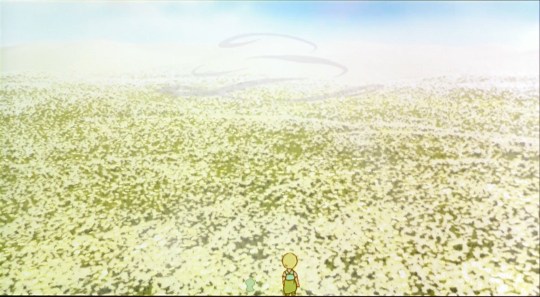
I’m not going to dwell on this too much because I’m going to be going more in detail about it below, but our story starts off in Wallace’s hometown of Summer Memory, a fictional rural village in Colorado, in 1995. (As mentioned earlier, this is a bit of a timeline contradiction; Adventure episode 45 establishes that “the one who wishes for stability” and the Agents didn’t get the idea of human Chosen Children until 1995, whereas the events of Hurricane Touchdown imply he’d been one before then.) Chocomon suddenly vanishes, and a gust of wind is left behind, implying that he must have been kidnapped. It’s not exactly said by what he was taken by (Digimon: The Movie ties it into Our War Game! by having both be traced to a “virus”, but no mention of such is made in the original Japanese version).
The mystery of what it is that took Chocomon away is never fully elaborated in the course of the movie, but as it goes on, it becomes increasingly apparent that it doesn’t actually matter. Why? Well, stay tuned.
So, timeskip to 2002!
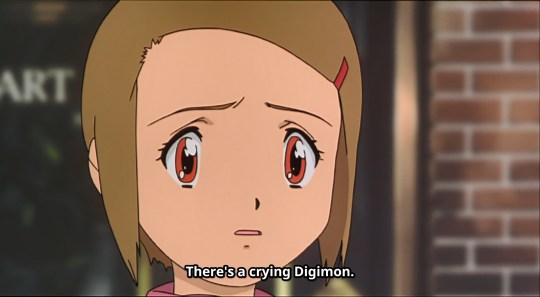
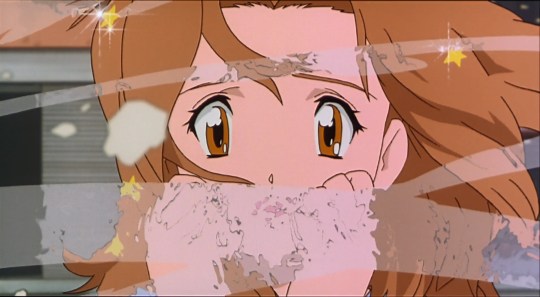

As Takeru and Hikari are visiting Mimi in New York, Hikari, who is known to have a bit of an empathic connection to Digimon, senses that there’s a “crying Digimon” (this will be important later), and Mimi suddenly vanishes – as do the other Chosen Children.
I think part of the reason this movie is often pinned as feeling like an acid trip is that the demeanor and attitude the 02 kids express in this movie feels a little too laid-back for the very urgent situation of their seniors having suddenly up and vanished (which is also not helped by the movie’s overall soundtrack being a lot more laid-back than the events on screen should suggest). This is especially odd because it’s absolutely not like the kids aren’t worried about their seniors at all! Rather to the contrary; “getting Taichi and the others back” is the major motive driving the whole group for the rest of it, and it’s constantly brought up as their goal in dialogue, shaping their actions throughout the rest of the movie. The execution of the dialogue and the overall direction create a bit of a tonal mismatch, but on its face, the actual storytelling checks.
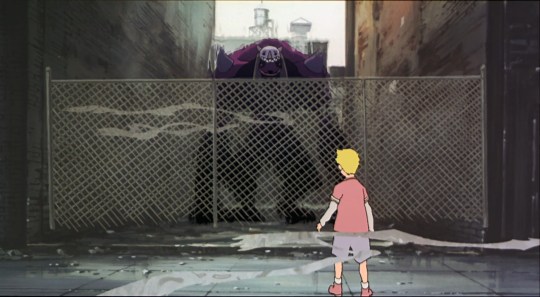
Shortly after, Chocomon – now evolved and corrupted into something – appears, and Wallace and Gumimon confront him.
The fact that Wallace refers to his partners by their Baby-level names (Chocomon and Gumimon) even after they’ve clearly evolved brings up a lot of interesting implications. One is that, not having been privy to any great adventure in the Digital World before, Wallace doesn’t have a lot of awareness of names changing after evolution the same way his Japanese peers do. But another important thing that comes out here is that, through the course of this movie, Wallace primarily sees his partners the same way he did as a young child. A lot of this movie’s story centers around Wallace’s difficulty in moving on from the past and accepting that things aren’t the same way that they are anymore – and so, just like how he has a hard time swallowing that the circumstances have changed, he has difficulty seeing his own partners as having changed, and calls them by the same names despite everything.
Takeru and Hikari catch on, and Hikari’s psychic sense catches on that something’s happened to her brother, too.
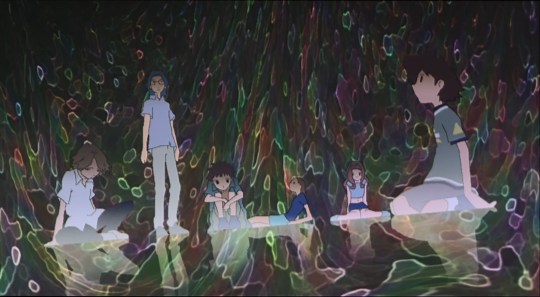
Oh, and incidentally, said seniors aren’t in a pleasant place to be in at all.
The fact that the older kids are clearly Not Having a Good Time in the realm they’ve been kidnapped to – it’s depicted as cold, lonely, full of negative emotions, and eating away at their ability to even bodily function – is very heavily connected to what we later learn about what’s been going on with Chocomon through the last seven years. Moreover, the one truly coherent thing Taichi and Yamato can spit out at this stage is concern for their siblings – i.e., love. Keep that in mind for later!
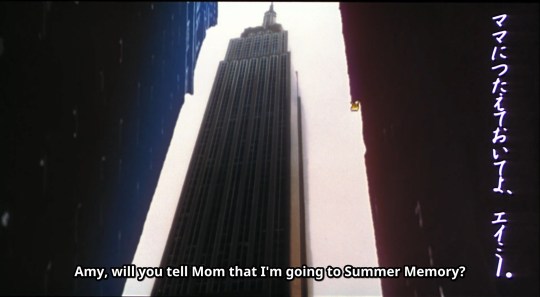
Wallace drops a line to his family (”Amy” presumably being his sister) saying that he’s going to head to Summer Memory, and skips town. Repeat: Summer Memory is in Colorado – he’s doing something as drastic as going out of state to follow Chocomon, which naturally does not amuse his mom very much (as we find out later in the movie). Patamon eavesdrops on the conversation and relays the information to Takeru and Hikari, who contact Daisuke in turn.
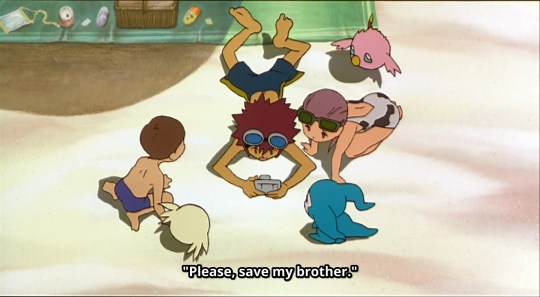
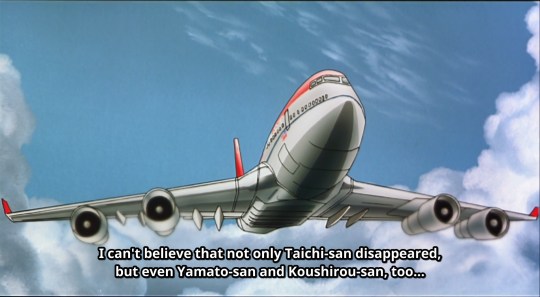
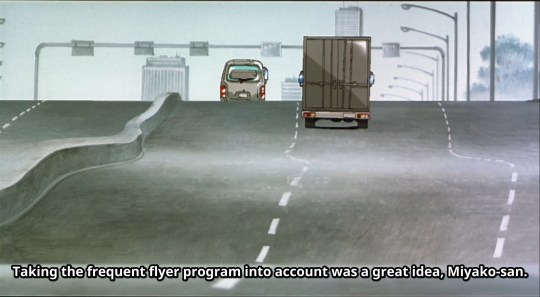
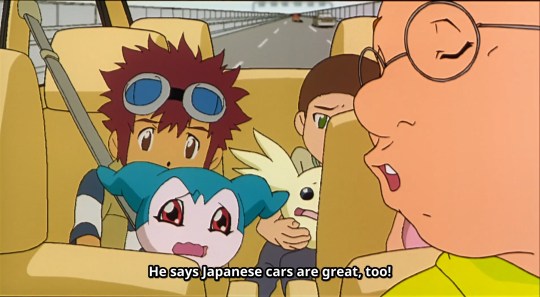
So the remaining three kids nyoom all the way to the US using frequent flyer miles (which makes you really wonder whose those are, or what on earth they told their parents to allow three elementary school kids go around unassisted in another country) to go save their seniors, which apparently doesn’t fund their trip all the way to Colorado, forcing them to hitchhike from New York.
(We also get a quick scene implying that Daisuke has better proficiency in English than Iori and Miyako, as he translates some of the statements for the guy they take a ride from. This is pretty surprising, given that Daisuke hasn’t really been portrayed as particularly book smart…but then again, language skills sometimes just happen to come naturally to some people regardless of skill in books, and hey, it might just come in useful for his future ramen chef career in New York…)
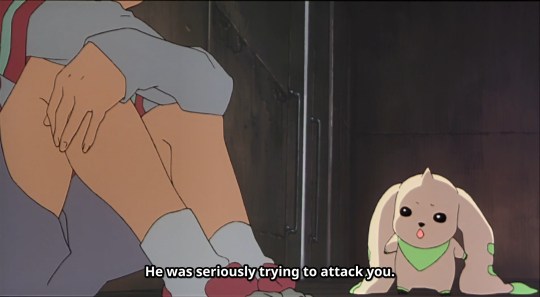
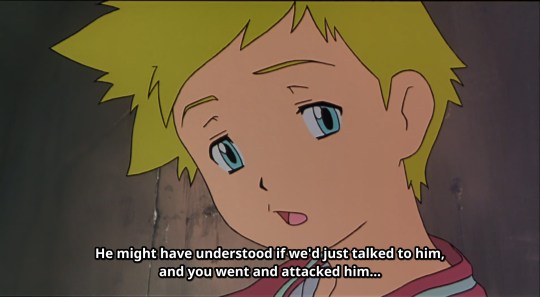
We get our first major scene of dialogue between Gumimon and Wallace, and we learn quite a bit about their characters in the process. Gumimon has a similar laid-back attitude to the more prominent Terriermon in Tamers, but beyond that (and a shared voice actress), it’s important to note that they have very different personalities otherwise. In this scene, Wallace and Gumimon get in an argument over how to handle Chocomon, with Wallace insisting that they shouldn’t have attacked him and that they should have just “talked” about it – even though, as Gumimon correctly points out, he was pretty obviously trying to physically attack Wallace.
In fact, at this part of the story, Wallace is being extremely irrational and in denial. You don’t even have to watch the rest of the movie to see that Gumimon’s very practical stance on the matter is reasonable – Chocomon was very much trying to attack Wallace, and getting caught in the fight was pretty much all he could do for Wallace’s safety. But Wallace, still stuck in the past, can’t accept that at this point in the movie, and, honestly, is being a bit of a brat about it too – he’s engaging in progressively more self-destructive behavior over the course of the movie (ditching his family to set off by himself in order to hitchhike to Colorado, for one). We later find out that Wallace is specifically obsessed with going back to the flower field where he lost Chocomon, having independently come up with the idea that this would somehow let everything go back to what it was before – even though there was really no sign this would actually fix anything.
The Adventure universe generally runs on a concept that a Digimon partner is representative of part of the self, and so, tying that into Wallace and his two partners, it can be taken that Gumimon and Chocomon reflect the duality of Wallace as a character – Chocomon representing his desire to latch onto the past and hope that everything can be the same that it was before, and Gumimon as Wallace’s sense of reason, advising him about the reality of the situation and how to practically get through it (and, thus, to move on). In fact, Gumimon is the one constantly advising him about said self-destructive behavior (reminding him that his mom is probably worried about him, but also berating him for just ditching the train as a result instead of thinking about how that’d leave them without reliable transportation for the rest of it).
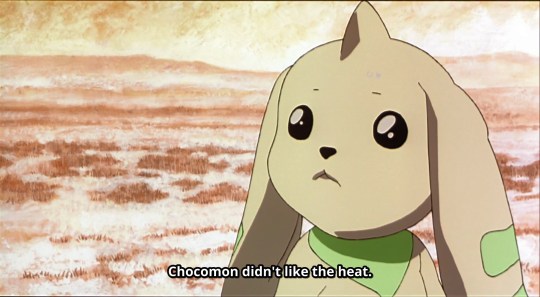
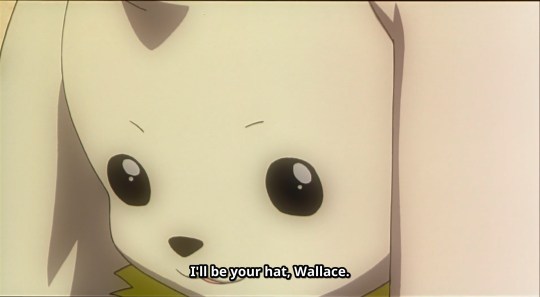
The symbolism is driven in even further when the only thing Gumimon has to say, in response to Wallace clinging further onto the idea that going to the flower field will fix things…is a cryptic statement that Chocomon didn’t like the heat, then suddenly offering to be a hat to provide Wallace shade. Because right now, Wallace and Chocomon are the same: clinging hopelessly to shards of the past.
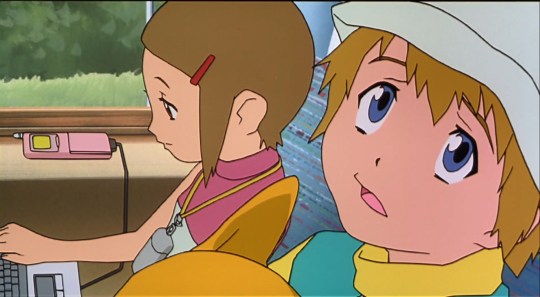
The other 02 kids make their way to meet up in Colorado, but run into some snags when Daisuke, Miyako, and Iori end up missing the exit to Denver (Takeru is not amused), and Hikari and Takeru’s train ends up stranded thanks to Chocomon’s interference…
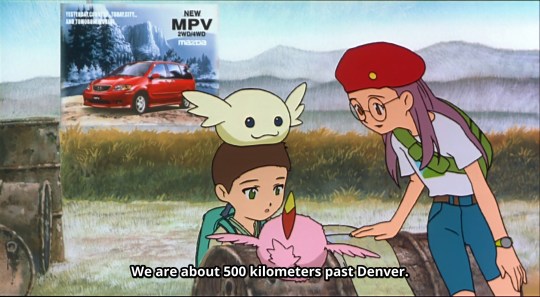
…and, making things worse, Daisuke, Miyako, and Iori try to take a plane back to Denver, only to overshoot it again. (Sorry, Taichi…your juniors are idiots.)
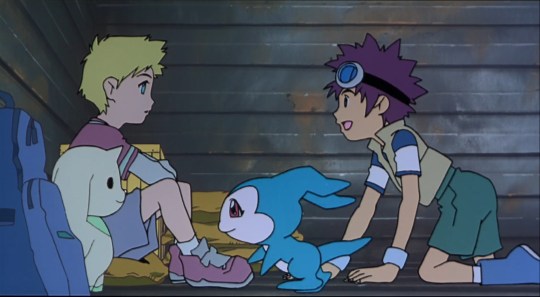
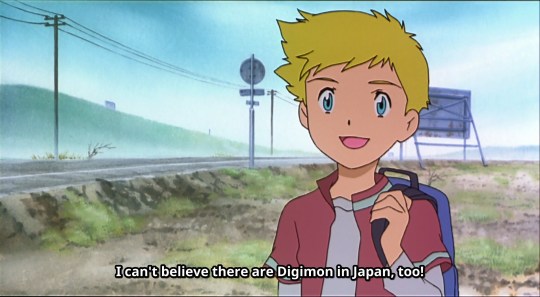
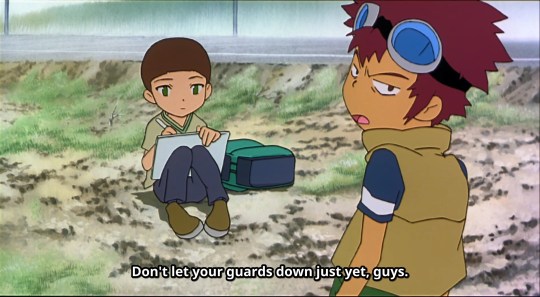
Fortunately, they get lucky by running into the very same boy they’re indirectly looking for on their way to hitchhiking. We learn that Wallace has never had exposure to other Chosen Children before to the extent of knowing there were any Digimon in Japan, nor has he ever been to the Digital World, so for all intents and purposes, his experiences with Chocomon and Gumimon are all he knows (i.e. he has no awareness of large-scale Digital World affairs). He also apparently speaks Japanese, which is convenient for this movie so that they don’t have to have a language barrier, but, amusingly, Wallace claims that it’s because he “had a Japanese girlfriend once”. (Gumimon, who is much more reliable of a source, says that he’d apparently put an honest effort into studying, so an interpretation that Wallace really likes anime or something is not out of the question.)
It’s also interesting to see how the others react to him, especially considering that it’s becoming increasingly apparent that he’s involved with the disappearance of their seniors. Miyako is as openly friendly as she generally always is, Iori presses him very calmly about questions relevant to the disappearances and Chocomon without even batting an eyelid (future lawyer in training here), and Daisuke is suspicious from the get-go…which is exacerbated when Wallace starts flirting with Miyako. The running gag of Daisuke getting angry about Wallace flirting with Miyako has a lot to unpack here – the most obvious standby is the shipping interpretation (or, at least, that Daisuke may be as protective of Miyako as he is Hikari), but there are other points to observe as well. Firstly, Daisuke is a rather abruptly straightforward and overly honest person, and it makes sense that he’d play badly with people who seem dishonest – after all, his suspicions of Wallace started even before he started flirting, and he also shows similar hostility around Takeru (also not a very straightforward person) when he suspects he’s being made fun of. But also, the Pixiv dictionary entry takes the interpretation that Wallace’s personality had gotten a bit “warped” by his experiences – or, in other words, he’d developed this penchant for acting like a flirt, wandering off on his own, and altogether being incredibly wishy-washy because of the trauma of losing Chocomon and his inability to get over it.
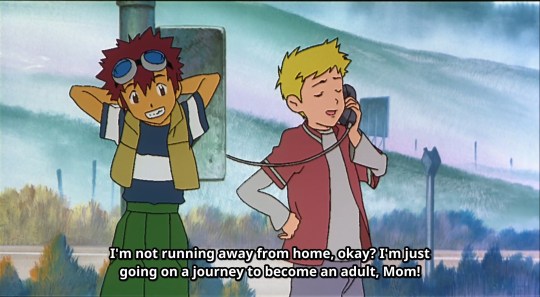
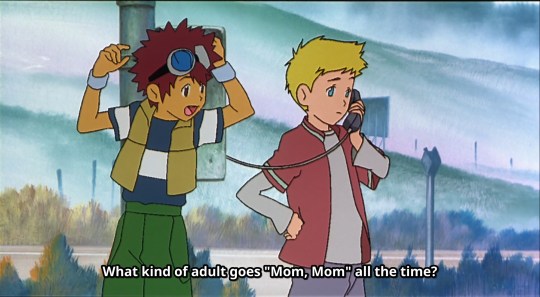
And as much as Daisuke’s being a prick about it (to the point that mocking Wallace for it gets him left there stranded with him), he’s absolutely right about the contradiction Wallace’s posing – he’s acting all high and mighty about trying to become an “adult” (meaning that going off on his own and flirting with girls presumably are part of his perception of what Mature Guys do), yet he’s being a total mama’s boy by constantly dropping everything to call her repeatedly through his trip. (It’s even worse than the subs here suggest; he calls her “mama”, the kind of super-affectionate language used by Mimi and Ken.) As Gumimon says, Wallace thinks he’s actually right, but he doesn’t actually have it together at all.
Another interesting thing to note here is that at this point of the movie, Wallace calls Daisuke “Daisuke-kun” (with honorific attached, slight distance). Remember this for later.
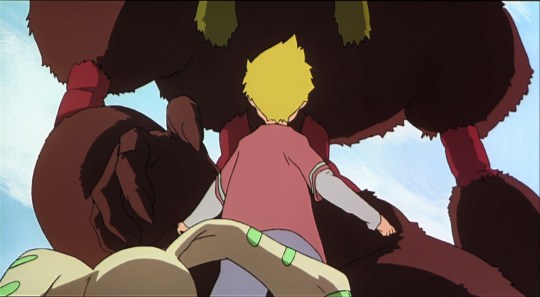
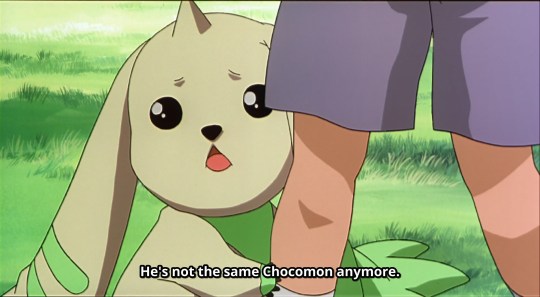
Chocomon appears to confront them again, but he seems to not properly recognize Wallace – because, as we later find out, he doesn’t see the current Wallace as “Wallace”, and will accept nothing less than a younger Wallace from exactly the way he was when they were separated. (It is later stated in the movie that this is why he kidnapped the seniors and turned them younger; since he can’t recognize “Wallace” the way he is now, he’s taking anyone he can find with a Digivice and de-aging them in the hopes that he’ll find “Wallace” among them.) Gumimon recognizes that Chocomon is beyond recognition, and tells Wallace to not see him as Chocomon, but Wallace refuses to accept this and continues to intervene in the fight, telling Chocomon that they’ll meet again in the flower field. Again, Wallace’s mentality isn’t that different from Chocomon’s at this point – he may not be delusional to the point he wants to literally turn back time, but he still thinks that reproducing the conditions of seven years prior will fix everything and make it all better again.
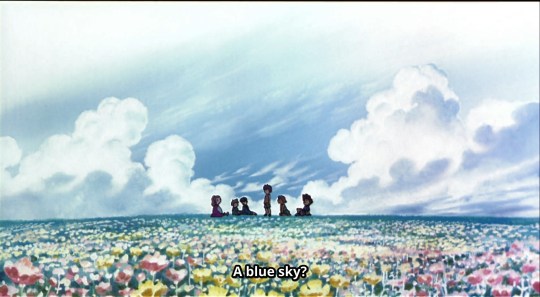
During this whole time, the older(?) kids are getting progressively younger, and it’s turning out to impact not only their physical bodies but also their mentalities. At this point, they’re starting to lose awareness of what’s happening to them, as they become more and more connected to Chocomon’s emotions.
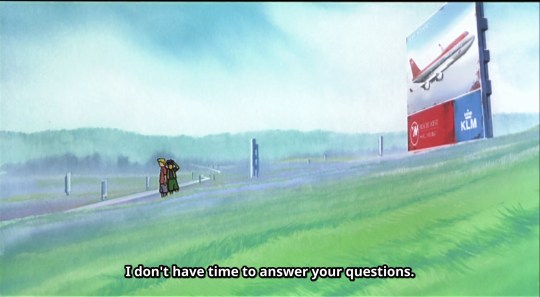
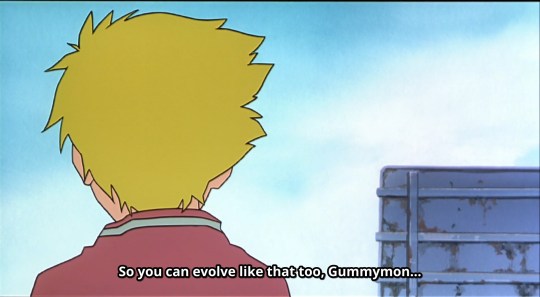
Daisuke is smart enough to catch on that Wallace definitely knows what’s going on, and starts to interrogate him. Recall that Daisuke is completely within his rights to do so at this point – Wallace is not only acting incredibly shady, he’s also being dismissive and refusing to give Daisuke any concrete answers about something that most certainly involves him at this point. As the 02 kids keep reiterating, their seniors have been kidnapped, and it’s pretty clear to anyone that Wallace knows something about this, but he continues to blow them off.
Wallace also doesn’t seem to be very happy about the fact Gumimon had evolved during the battle – remember, Wallace is very resistant to changes in his status quo, and especially when it involves Gumimon evolving in a similar way to Chocomon.
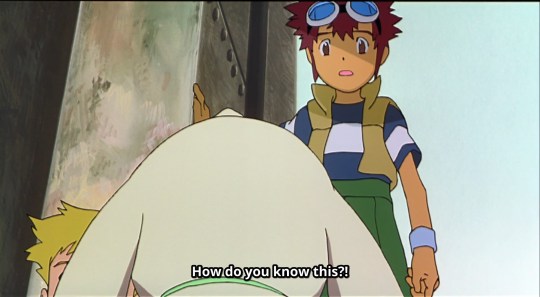
Daisuke continues to pry into what’s going on with Wallace and Chocomon, and Gumimon, who understands that there’s no use in denying that this is a problem, tries to be straightforward about it – but Wallace, still stubbornly refusing to open up about it, won’t even let Gumimon tell Daisuke about the truth.
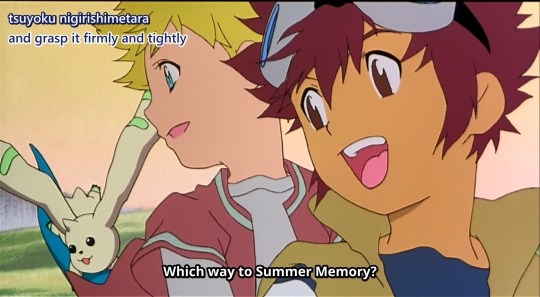
Daisuke realizes that they’re not going to make any territory as it is, so he decides to have Lighdramon take them to Summer Memory for the time being, bonding a bit more with Wallace in the process.
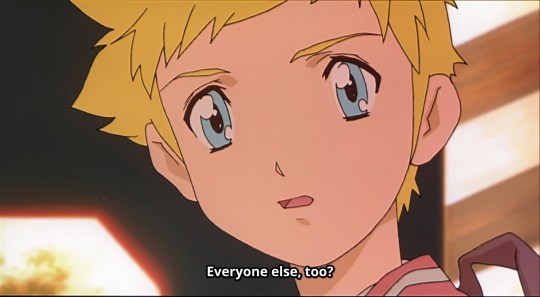
Once they reach Summer Memory, the kids learn about Takeru and Hikari getting stalled by Chocomon on the train, and the fact everyone else on it had disappeared – meaning that the responsibility that Wallace is carrying for not taking care of this problem begins to weigh further on him. Daisuke, Miyako, and Iori continue to interrogate him about what he knows.
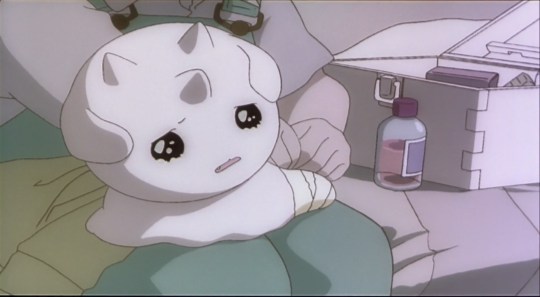
But Wallace, still stubbornly, refuses to talk, and being in Summer Memory only drowns him in further memories of his past with Chocomon and Gumimon. We learn a bit more about Gumimon’s past, too – apparently, he was quite the crybaby…
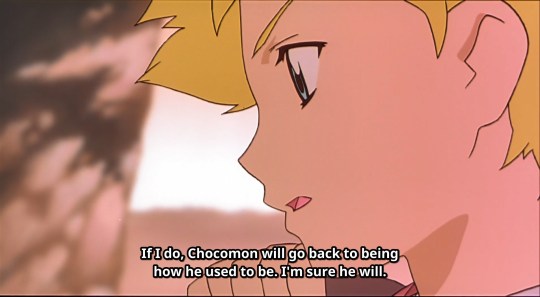
And when Gumimon finally begins to spill the details of what’s going on – that Chocomon wants to see the younger Wallace and is kidnapping kids with his Digivice and turning them younger as a result – Wallace still continues to double down on his denial. Notice his wording – his specific insistence that things will go back to “how they used to be,” because it’s not just about getting Chocomon back, but also a fixation on recreating that happy childhood he had with him.
(There’s also a bit of a cute moment around here where Daisuke asks Wallace if he needs to call his mom – after having teased him for being a mama’s boy earlier, Daisuke really is starting to care about his welfare. It’s also amusingly mentioned that Daisuke, Miyako, and Iori are broke out of money until they meet up with Takeru and Hikari again…)
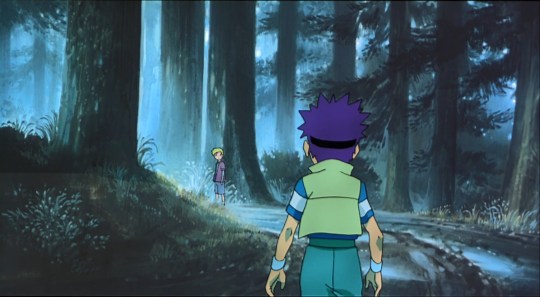
That night, Wallace tries to go off by himself to the flower field, not even bringing Gumimon with him – as he implies later, he doesn’t even want to get Gumimon involved with this because he was the closest to Chocomon – but Daisuke, having finally caught on to his suspicion that Chocomon is not only relevant to Wallace but also Wallace’s partner, confronts him about it. Wallace thus finally spills the details – that Gumimon and Chocomon were born from the same egg, that Wallace kept them from his mother and stuck with them during childhood, and that, seven years prior, Chocomon suddenly vanished while they were playing at the flower field.
Wallace: I’ve never been able to forget about Chocomon since then. Not even after moving to New York, not even once. We were such good friends…So why did Chocomon have to end up like that? Does he hate me for not being able to save him?
Daisuke: So the enemy we’re fighting is actually your Digimon? Your most important friend?!
Daisuke: Of course you’d never be okay with that…
Daisuke is in shock, even though he’d already started to suspect this.
I said, earlier, that Wallace is being extremely irrational and in denial. I did not say that his feelings aren’t valid. Wallace’s situation sucks, and Daisuke recognizes why this hurts for him so much, especially after putting himself in Wallace’s shoes (and in fact it’s even worse for Wallace; Daisuke’s only known V-mon for less than half a year, whereas Wallace is talking about his formative childhood friend).
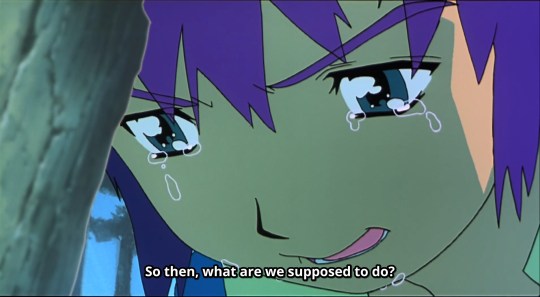
Daisuke: I’d never be able to do it. If V-mon were to turn into something completely different…Even if he went on a horrible rampage…There’s no way I’d ever be able to bring V-mon down.
Wallace: Daisuke…
Daisuke: So then, what are we supposed to do?
Wallace: It’s not something you need to be crying over.
Daisuke: But…
This entire scene is an interesting one for many reasons, especially because of the position in which it aired – this was in the middle of the arc in 02 when everyone was getting their second Digimentals. Daisuke had, only a few episodes prior, expressed trepidation over “friendly fire” – fighting any friend who had become controlled by the Digimon Kaiser. This is consistent with that (and the 02 kids’ general bleeding hearts and difficulty with fighting friends), and it’s even worse – unlike before, when we were talking about evil mind control, Chocomon is pretty obviously a victim of his own madness. And although Wallace continues to insist that this isn’t Daisuke’s problem, Daisuke, for all he’s rough around the edges, is a genuinely kind person who thinks of others to the point he breaks down in genuine tears over the problem, and it’s consistent with not only his prior characterization of thinking about others’ feelings in 02 episode 8, but also how this eventually ties into his indignation over seeing others being hurt (episode 20) or their feelings being trampled on (episode 49).
Another interesting thing here is that at no point in the movie is “killing” ever brought up, but rather the word used is taosu, which literally means “defeat”. In 02 proper, its use is somewhat euphemistic – most famously, it was used in episode 44, when Miyako and Hawkmon have a crisis over killing LadyDevimon (so in short, there’s no illusions about the fact killing is in play here). But in this context, it’s not even really about killing. Wallace doesn’t even want to fight in the first place. The sheer action of physically beating up a beloved friend is painful, with killing as the ultimate unwanted outcome. Everything about this sucks. But Daisuke correctly points out that Taichi and the others’ welfare is on the line here, and everything feels like the wrong thing to do. “What are we supposed to do?”, indeed.
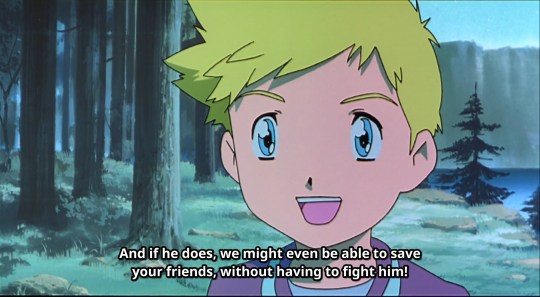
So that’s why Daisuke momentarily indulges in Wallace’s denial-induced pattern of thought, because it really does seem like the only out here. (Especially because, from Daisuke’s perspective, Wallace seems to understands this situation better than he does – even if he doesn’t actually.) If they go to the flower field, they won’t have to fight and everyone will be saved and it’ll be fine! Wallace is irrational and in denial, but you can’t blame him and Daisuke for really, really wanting to believe this.
And Daisuke drops this zinger of a line, too:
Daisuke: So don’t say you’re gonna go alone.
Daisuke’s characterization really is important here, because, again, this movie came out during the first arc of the series, before episode 21 and the second half that centered around Ichijouji Ken’s redemption. At this point in the series, Daisuke was still being extremely deferential to others, especially his seniors, in almost all cases, and although episode 8 was a momentary glimpse into the kind of resolve Daisuke could have when it involved something he really cared about, this movie is really the first major sneak peek into how supportive of a person Daisuke is going to develop into, especially when it comes to Ken.
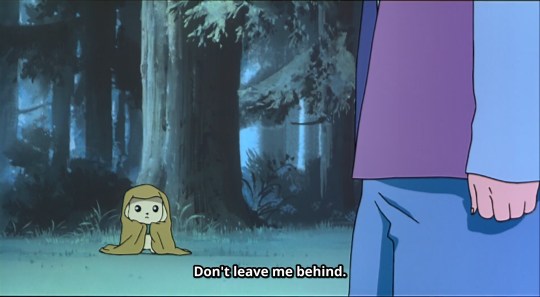
And Gumimon reaffirms that he’s going to stick by Wallace no matter what – filling the traditional role of a partner that Chocomon won’t anymore.
So they go to the flower field, and everything…fails spectacularly.
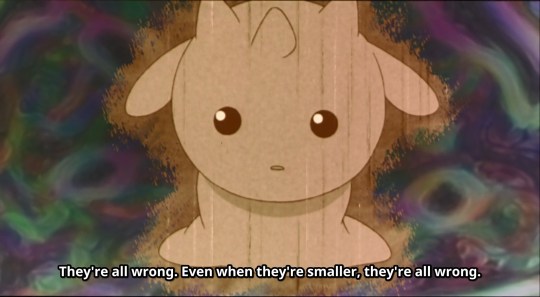
Well, before that, we get a glimpse of how the older kids are doing (they’re barely even conscious now), and we finally get to see Chocomon “in his element” and not as a rampaging monster. Things really, really aren’t going great for Chocomon either. He desperately and sadly jumps among the kids, trying to find Wallace among them, and what he really, really wants is just to be with his partner again. But they’re all “wrong”…
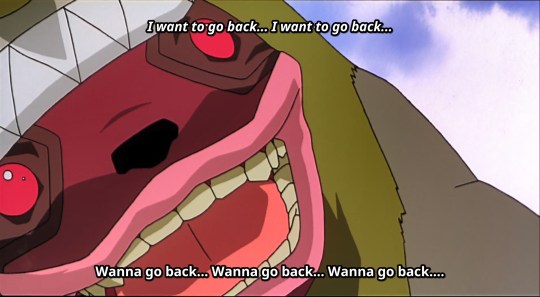
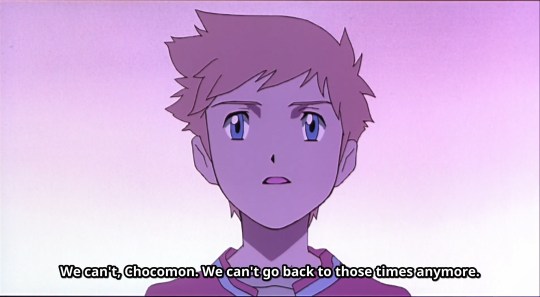
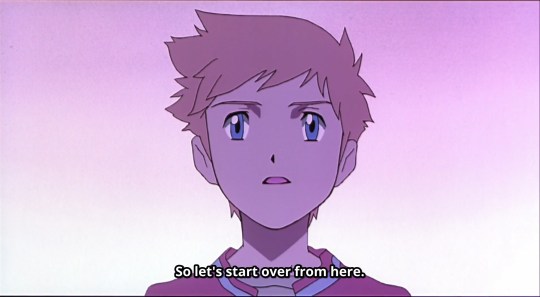
At first it seems like Wallace is making headway – for a second, Chocomon even recognizes him as Wallace! – but he continues to insist that he wants Wallace to come “with him”, to where it’s “cold and lonely and no one is there”. The way he starts chanting that he wants to go back is represented by the young Chocomon’s voice getting progressively lost in the monster’s voice, and Wallace, starting to grasp how futile Chocomon’s clinging to the past is, makes his first statement of the movie’s core theme: you can’t go back to the past, the only thing you can do is look forward and think about what you can do from there.
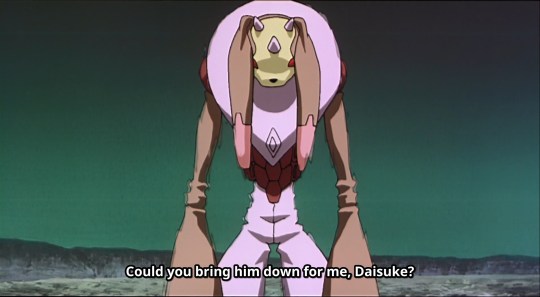
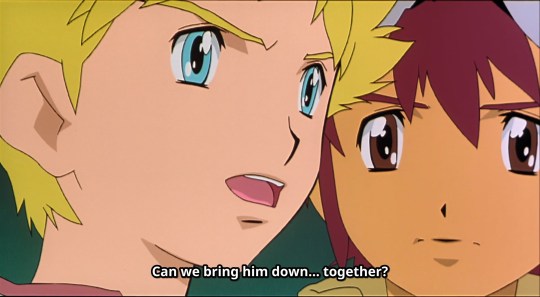
So after witnessing very clearly, in front of his eyes, how Chocomon is not going to listen to reason and will accept nothing less than something he can’t have, to the point of evolving and distorting everything around him, Wallace’s denial finally hits its limits, and he accepts that fighting him will be the only option out. (Again, note the use of “defeat” here – it’s not really about beelining straight to euthanizing him as much as Wallace has finally gotten over his refusal to fight Chocomon at all.) And considering that the situation is clearly rapidly escalating, and that Chocomon himself is clearly not in sound mind and having a terrible time himself, it doesn’t take much to see why the bleeding-heart Daisuke would also end up conceding so quickly. There’s a limit to how much you can hold out with pacifism when that just happened right in front of you!
(Also, Wallace no longer uses the honorific on Daisuke. Friendship level up!)
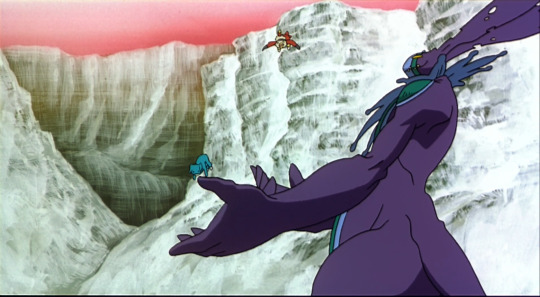
Chocomon evolves further and further, and his personality starts to actually take a turn for the cruel as he starts toying with the Digimon. In fact, it’s made pretty apparent that they’re no match for him from the get-go – he keeps toying with reality and forcing the Digimon back and forth between forms. He ends up “altering the world” into something reflective of his own heart, and it’s repeatedly pointed out that it’s “cold and lonely” – in short, Chocomon is subjecting the world to feel the same pain and loneliness that he felt, the pain that was enough to drive him mad.
And Wallace finally has this to say:
Wallace: Like Daisuke said, I’m a big baby. But you’re not Chocomon anymore. No, you’re the one who did this to Chocomon…Chocomon was all by himself and lonely, and in that loneliness, he tried so hard…But you took his heart and locked it away somewhere! I’m going to fight. If I defeat you…If that means I can free Chocomon from you…Then I want to fight, too! I need strength…
Firstly, Wallace acknowledges that he’s been a brat – that he’s been philandering around and acting spoiled and stringing everyone around (character development!!). And secondly, Wallace finally acknowledges the truth of Chocomon no longer being recognizable anymore. The ending quarter of this movie focuses heavily on the idea that Chocomon has now become so distorted that he can no longer even be considered the same thing anymore – it’s ambiguous as to whether that “you” that Wallace refers to having taken Chocomon away is actually a separate supernatural entity, or whether Chocomon was drowning in his own loneliness to the point those negative feelings became their own entity and consumed him.
In actuality, though – it doesn’t really matter! 02 as a series would also go on to blur the boundaries between external interference and internal forces – Ken having the Dark Seed as an influence but also being personally responsible for his own emotions driving him over the edge, and having to take responsibility regardless, and Oikawa technically being possessed by Vamdemon but still being goaded on by his own fixation with the past (in fact, notice how all three of these cases have to do with a fixation on things that can’t be brought back). Right now, the only thing that matters is that Chocomon is no longer recognizable, the thing in front of Wallace is no longer the same friend he knew, and even being able to bring back Chocomon’s sense of self is something Wallace wants.
(Daisuke also throws in a more charitable interpretation of Wallace’s actions even when he’s being hard on himself, pointing out that he can’t really be called a “baby” when he also did have genuine determination to come all the way there to find Chocomon despite his age.)
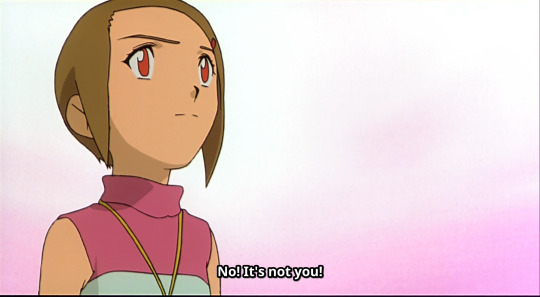
Hikari and Takeru arrive on the scene, and after Daisuke loses his marbles a bit over his happiness at seeing Hikari-chan there, Hikari points out the same thing: “You’re not the Digimon that was crying.”
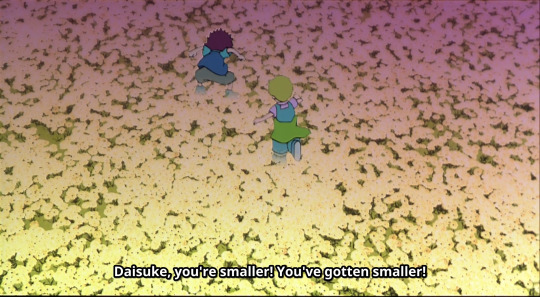
Chocomon starts turning the 02 kids younger too – and remember, it was established earlier that he was using the Digivice as a guide. That meant it made sense for him to target the older kids, since they had the same model of Digivice Wallace did. But Daisuke and the others have D-3s, and there’s no way to really mistake them for Wallace – so in other words, Chocomon has devolved to inflicting cruelty for no good reason, with the original motive having completely vanished.
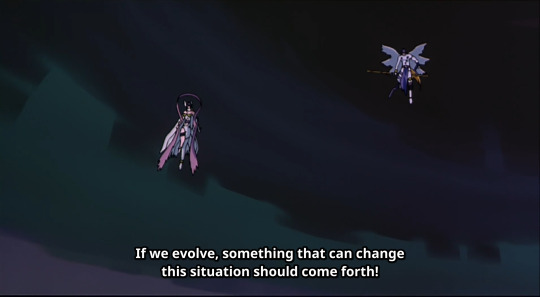
In increasing desperation, Angewomon and Angemon decide to evolve, and…look, I don’t have an explanation either, but I have to admit I’m somewhat amused by the fact that even they don’t really seem to have an explanation beyond “well, we’re desperate and hopefully it’ll do something!”
So they evolve, and Chocomon oneshots them. But that’s okay, because they released some golden Digimentals for Daisuke and Wallace to use! So V-mon and Gumimon get shiny new golden forms –
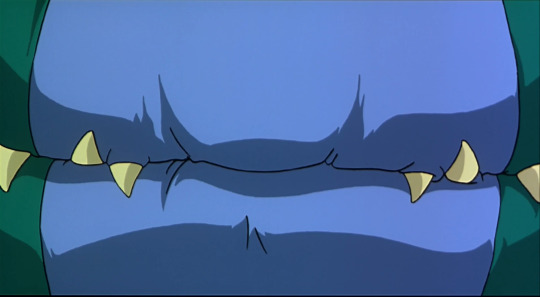

– and Chocomon pretty much oneshots them, too. More specifically, he eats them…and within his body, Magnamon and Gumimon’s consciousness gets eaten apart to the point they start forgetting their partners. Wow, this situation just got worse.
Yeah, so, despite the movie being named after the golden Digimentals, the actual point being here is that power means absolutely nothing in this situation. Remember, I pointed out that even from the beginning Chocomon was straight-out warping reality – they really didn’t have a chance.
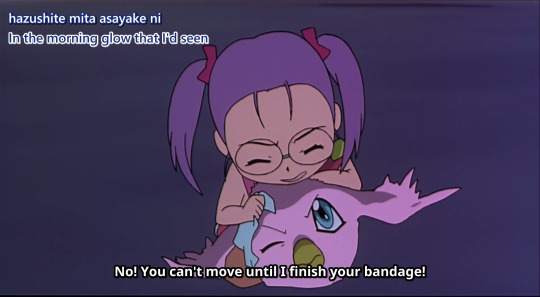
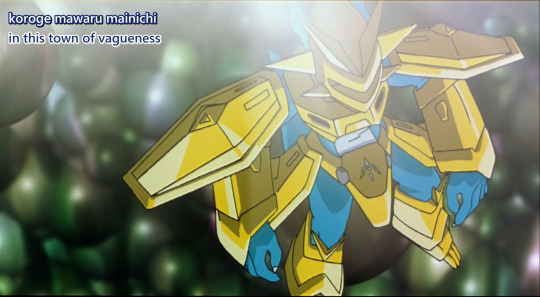
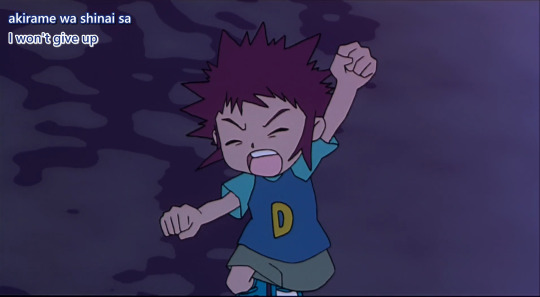
So basically, everything devolves into complete chaos. Everyone’s being turned into little kids, with the mentality to match. All the Digimon are being oneshotted and being tossed around like tissues. But the one constant through all of this is that the kids are constantly running after their partners.
Remember how, back when the older kids were first getting sucked into Chocomon’s world, the one thing that seemed to remain intact at first was “love”? That “love” is what reaches out to Magnamon and Gumimon inside Chocomon, and makes them remember their partners again.
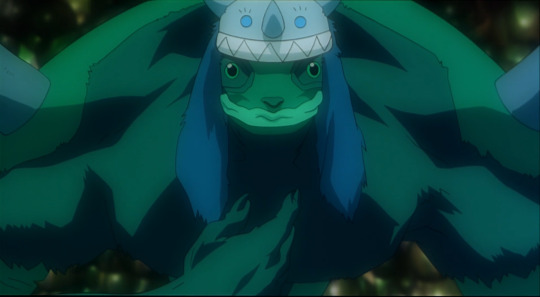
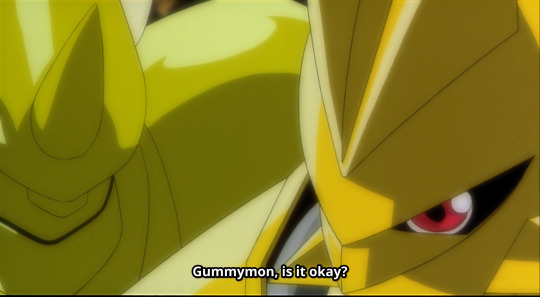
And, more importantly, that “love” is what awakens Chocomon – the real Chocomon – inside his consciousness, and he wordlessly makes a gesture begging Magnamon and Gumimon to kill him. And so they do – with understanding and consent from all three involved.
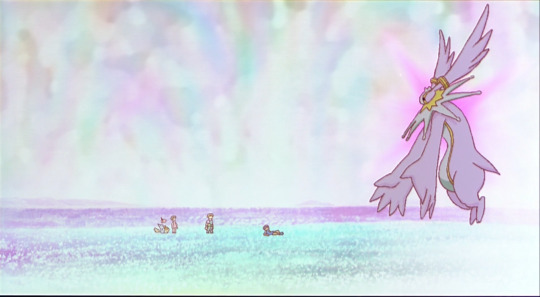
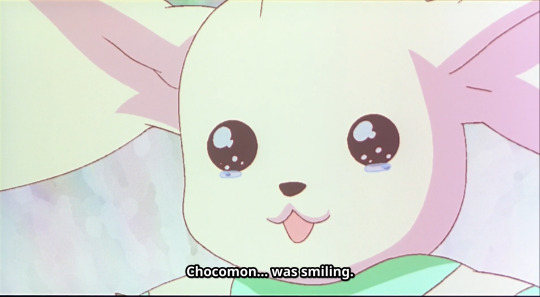
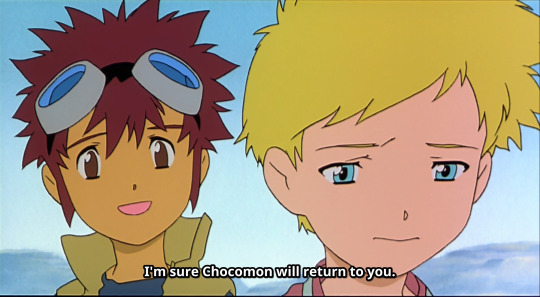
So in the end, the most extreme conclusion was reached. Chocomon died, at the hands of Daisuke and Wallace’s partners. But in that moment before he died, Chocomon’s pain was relieved, and he was himself again – Gumimon says that “Chocomon was smiling”, even in spite of his usual personality being that of a crybaby. They may have failed in their struggle to prevent the inevitable conclusion of having to kill Chocomon, but they did, to some degree, “save” him – so all of it did mean something in the end. And Daisuke promises that this still doesn’t mean the end of everything – they may have not been able to bring back Chocomon, and especially not in the exact way that would make things “the way they were before”, but the future is still there for him to return someday.

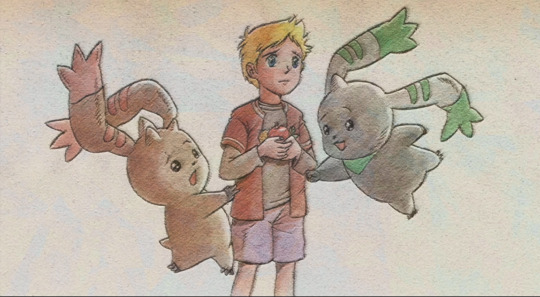
So, we clean up loose ends. Taichi and the others are returned safely, and in the end, Wallace decides to still be a vagrant for a bit longer – and to flirt with Hikari and Miyako a bit before he leaves. In the end, Wallace still has a long way to go if he wants to really grow as a person. But as Miyako points out, he’s gotten a bit bolder than he was before – and he’s greeted with an egg in the end, as if opening up new possibilities.
The Door to Summer contradicts the finding of this egg, or at least opens up the possibility that this wasn’t actually Chocomon’s, so it’s ambiguous as to whether the frame of Terriermon and Lopmon at the end of the credits is meant to be taken literally, or if it’s just symbolic. But even in the case of the latter, Chocomon is seen as Lopmon, a form he never got to have in Wallace’s childhood – so, in the end, it’s about different possibilities opening up in the future, rather than replicating that of the past.
All right, let’s recap this movie for those doing a tl;dr! Or, more specifically, let’s recap the events in chronological order:
Sometime before 1995, an egg emerges from Wallace’s mother’s computer, and hatches into twin Digimon, Chocomon and Gumimon.
In 1995, while playing in a flower field in Summer Memory with Wallace and Gumimon, Chocomon disappears for unknown reasons.
For the next seven years, Chocomon is trapped in delirium, full of loneliness and pain from being unable to see Wallace, and starts to become obsessed with the idea of reuniting with him, but, in his madness, accepts only a version of that reunion that involves him being the same young child he was when they parted, as if nothing had changed since.
Wallace, likewise, develops a fixation with getting Chocomon back so that things can be like “the way they were before”, even after moving to New York.
In 2002, Chocomon begins to kidnap kids with the same model of Digivice that Wallace has, and starts to forcibly turn them younger and send them into delirium like his own, hoping that this will bring the “Wallace” he wants back. Wallace starts to chase after him and decides that returning to the flower field in Summer Memory will allow him to communicate with Chocomon and make him go back to the way he was before.
Takeru and Hikari, hoping to find a lead on their seniors’ disappearance, drop a line to Daisuke, Miyako, and Iori, who head to the United States, also hoping to find a lead in Summer Memory. On the way, they run into Wallace, who is evasive about his connection to Chocomon and the kidnapping incidents.
At Summer Memory, Daisuke confronts Wallace and learns about his story, emphasizing deeply with the difficulty in killing an important friend, and agreeing that they should reach out to Chocomon at the flower field.
Chocomon continues to fall deeper into madness at the flower field, and Wallace and the others realize that they have no choice but to fight him. As Chocomon becomes so distorted he’s no longer recognizable, Wallace declares an intent to at least save his consciousness.
As the fight carries on, the kids are de-aged by Chocomon in his madness, and Magnamon (V-mon) and Gumimon are swallowed by Chocomon. However, the kids’ love for their partners awakens Chocomon’s consciousness again, and he asks Magnamon and Gumimon to end his pain.
With everything settled, Wallace and Gumimon are able to face forward into the future in the hopes of meeting Chocomon again and starting anew from scratch.
The Door to Summer
Actually, there’s not much to really be said about Hurricane Touchdown’s spiritual sequel The Door to Summer, except that it revisits similar territory to the movie, observing it more in Daisuke’s context than it does Wallace’s. (The story is very much more Daisuke’s than it is Wallace or Mimi’s.) The short synopsis is that Daisuke, having had a pretty bad time recently, finds himself in contact with a mysterious “winter” (in the middle of summer!) that seems to reflect his own heart…and a mysterious amnesiac girl whom Mimi names Onpu “Nat-chan”, who immediately latches onto Daisuke. In the end, “Nat-chan” turns out to be “a Digimon who’s taken in a lot of evil data,” who goes on a rampage and forces the others to fight and eventually kill her.
Although the reason for Nat-chan going on a rampage is more concrete than what was given in Hurricane Touchdown (it’s portrayed as “data chips” that seem like fireflies), The Door to Summer also makes it very clear that it wasn’t just supernatural influence, but also Nat-chan’s loneliness, desire for a human partner, and jealousy of Daisuke and V-mon’s relationship. Daisuke, while showing immense hesitation about fighting her when she had befriended them, still manages to “save” her in some way, to the point she actually verbally thanks him as she dies. And in the end, Daisuke and the others decide to take her egg and find a partner for her – even if she can’t be Daisuke’s partner like she wanted, she can still start anew with someone else.
Wallace in Kizuna
Warning: The rest of this post contains spoilers for Kizuna.
As said before, Hurricane Touchdown has been said to be the favorite Digimon movie of the director of Kizuna – and certainly, while Kizuna references all four Adventure-series theatrical movies, Hurricane Touchdown’s references are the least subtle, with the plot point of de-aging kids lifted directly from it. (Except, in this case, it’s in the context of trapping oneself in blissful memories rather than being portrayed as the upfront listless torture it is in Hurricane Touchdown.) Moreover, the theme of warning against being fixated on the past is just as present in Kizuna as it was in Hurricane Touchdown, especially when Kizuna’s main antagonist (Menoa) also falls victim to something that’s part supernatural influence and part getting swallowed by her own negative feelings…so it’s only fitting that Wallace himself makes a cameo in the movie. Two cameos, in fact.


The fact that Wallace is established as canonically existing within the Adventure main timeline has thrown a lot of people for a loop, especially since recent franchise events have made it questionable as to how it’s possible for canon to even make sense anymore because consistency has just gone out the window, but the Pixiv dictionary’s chosen rationalization for this is that, at the very least, “(some version of) Wallace exists in the timeline of the main story”. I’m inclined to agree with this evaluation; the fact that people around the globe can agree that the movie is questionably canonical but can’t even agree on how, and the fact that certain franchise entries considered canon (Tag Tamers) have their own contradictions, plus the fact that it’s not like Hurricane Touchdown takes a complete knife to timeline and lore common sense and more that it has some contradictory minutiae that are really easy to sidestep, it’s not actually that hard to say that some timeline of events that reasonably resembled Hurricane Touchdown (with maybe only some minor timeline or evolution differences) happened during the summer of 2002, and thus that Wallace exists.
Assuming that the story of our canonical Wallace is mostly the same or similar to that of the story presented in Hurricane Touchdown, Kizuna provides us with quite a bit of interesting information. We’re treated to two shots relevant to him: one in the form of his name at the top of Koushirou’s list of kidnapping victims, and one where he appears in person at the very end. It’s hard to miss him; he’s wearing similar colors to the clothes he wore in Hurricane Touchdown so you can identify him even at a distance, and he’s also the only loser around here with two partners. That’s right, two! Two!! Chocomon is back – and as Lopmon, exactly like the end credits card of Hurricane Touchdown depicted him!
So it looks like that, one way or another (after Hurricane Touchdown, after The Door to Summer, whatever, make up your own story), Wallace did manage to reunite with Chocomon and start a new life with him. It looks like not all of his habits have died – he’s depicted in a place with palm trees, meaning he’s definitely not in New York or Colorado, so either he’s moved again, is still maintaining the vagrant lifestyle, or just happens to be on vacation.
The other interesting thing here is that Wallace is depicted as one of the Eosmon kidnapping victims. According to Menoa, kidnapping victims were ones who were entertaining thoughts of wanting to go back to the past and remain a child forever – something that should intuitively be against everything Wallace learned in Hurricane Touchdown. But it’s important to point out that Eosmon’s lure is depicted as working on a subconscious level – certainly, if the kidnapping victims in Kizuna were to be outright asked if they wanted to be kidnapped and de-aged and trapped in their childhoods forever, most of them would probably say “no!”, and Wallace is likely no exception! But even if he’s starting his life anew with Chocomon now, it’s not hard to believe that there would still be lingering subconscious regrets about everything he’d lost with Chocomon and the childhood they could never spend together, ones that Eosmon’s allure would end up connecting with, even if the events of Hurricane Touchdown had consciously taught him better. Alas, being a human is hard.
#digimon#digimon adventure 02#hurricane touchdown#shihameta#digimon adventure last evolution kizuna#kizuna spoilers
111 notes
·
View notes
Text
Tbh, fanfic isn’t innately better than published lit. A work isn’t innately better bc you can break it down into prepackaged tropes and themes. There’s plenty of good fan fiction out there and plenty of bad literature out there, but fanfic isn’t just Better because it’s doing stuff with a media the author didn’t/couldn’t/didn’t want to do.
And honestly, at some point in their writing, I think a writer should want to move past exclusively writing derivative work. It can be a starting/entry point, it can be a nice to idk think up a fix for your favorite media, it can be a way to explore style and get feedback. But, at the end of the day, every work shouldn’t need to be attached to something else. Even if you end up writing a story that was heavily inspired at its core by another piece of media, it can still be its Own concept. Art grows from art and that’s nothing new but what is new(er), I think, is this almost resignation that nothing is new. If every story has been told before (which it kind of has and also very much hasn’t), why not fall back into tropes and media you love for each story? That is, I think, one of the failings of the mechanism, not getting into things like western/white co-opting of media not written/intended for that audience etc.
Nothing wrong with writing/reading fanfic but you aren’t better as a writer or reader just because of it and there’s still plenty good to be had in writing your own original work and reading the published work of others. Especially these days. Every day at work, I find a new story about something I would never have guessed would be a book. A picture book about a kid with flexible pronouns and their community, a trans high school coming of age romance, sapphic poc witches, nb and poly ace meet cute romance, historical reimaginings with any or all those things, stories based in mythos/countries I’ve never or barely seen represented before, the list goes on and on and all of those are based on books I’ve seen. I suppose what it boils down to is don’t settle and stop consuming original content critically and emotionally just because fanfic is comforting or familiar. Find new comforts and indulge in those you know, write what’s derived and something fresh. Both can coexist.
#eebwuispeaks#I’ve had this in mind a lot and it’s not very well articulated but#I felt like actually saying it for once
3 notes
·
View notes
Text
The Further Folklore of Supernatural
Here’s a little more folklore meta in light of how season 15 has been playing out if anyone is game. I genuinely thought that Moriah would be the end of the folklore stuff and tossed out “Folk the Author” as an “epilogue,” so this is probably less of an addendum than it is a waymarker as I try to continue to parse these themes into the last seven episodes.
Welp. *waves hands at everything* THIS is not how anyone expected 2020 to go. Things got a little bit big and I stopped thinking about Spn in light of needing that energy elsewhere. But I also don’t want this crapfest to ruin how I fan my favorite show, so here I go again. I will attempt a TL;DR, too!
If you’ve read my old “folklore” analysis here about how I think fairy tales and all their baggage fit into Supernatural season 14, you know that I believe Castiel has stepped into a Sleeping Beauty type story, and that coincidentally a few themes and symbolism from Snow White kept popping up around Dean. (I hold Sam to be a Protagonist in the modern “literary fiction” sense of the word, but emotionally, thematically, and narratively he’s always been a little inaccessible to me. I finally understood him when the death-of-the-author plot surfaced, and I’ll get to Sam eventually here. And Jack, there’s a little Jack in here, too.)
If you would rather have the TL;DR than read several thousands of words about how folklore and myth *might* be abstractly connected to an American genre show, all I can say is that I tried. The textual support is all in the folklore posts. This is as succinct a summary as I could fabricate. At least I’m not gonna talk about Sam and bricolage and freeplay! This is an almost completely theory-free post! If you don’t want to read or don’t need a refresher and just want to know how this has been working in 15, you can scroll down to “END OF TL;DR”.
So, to catch up, I’m not talking about the folklore and mythology that this show has always relied on for plot and MOTWs. I wasn’t drilling down into urban legends like Hook Man or world folk monsters like shtrigas or pishtacos. By “folklore” I mean the study of storytelling tropes and tale types that have been with us for ages. One of the many subtexts of the end of the series. I’ve been tracking this because I think it’s fun to see how fairy tale imagery and mythology might layer preconscious suggestions into the text of the show. I personally think it was loud enough to be seen easily, but more than likely viewers felt unsettled, felt cheered, or felt like they knew what was coming? I’m curious to know. Anyway.
When we found out that Kelly Kline was going to name her baby “Jack” waaaaay back in season 12, things started chiming. Jack and the Beanstalk. Jack the Giant Killer. Jack Tales. Jack is a powerful Western character, sort of a cross between a noble hero and a trickster, featuring in stories that often blur lines and boundaries. He is both the poor man’s youngest son and the equal to King Arthur’s heir. Jack is both everyman and extraordinary. Jack is so cool, I wish I had more time to parse that but his qualities are not subtle in the text/subtext, anyway.
But back to my half-crack reading of seasons 14 and 15.
Once upon a time in Supernatural, there were two fairy tales being told. Both fairy tales are found all over the world and in many forms, but they all can be grouped together because they all contain shared elements of the same basic plot or shared themes, and these two in particular are sister stories. So when I mention “Sleeping Beauty,” I’m talking about lots of different versions of the folk tale, and the same for “Snow White,” which can be found in one form or another in storytelling traditions all over the place. It is both helpful and irritating that these are both Disney movies, too.
Jack makes an allusion to Sleeping Beauty in 14x03 The Scar while talking to Castiel-- it’s the kind of subtextual flash that in and of itself means little and proves nothing, but then beginning with The Scar we got three stories in a row that dealt with “sleepers” of some sort-- Lora in 14x03 doomed to die because of a witch’s spell, Stuart in 14x04 Mint Condition in a coma because of a ghost attack, and Sasha’s father in 14x05 Nightmare Logic under the spell of a clever djinn. It’s powerful subtext, like a soft light that bathes these episodes in the color of fairy tale and makes Jack’s Dramatic Swoon at the end of Optimism all the more Dramatic-- subtext amplifying the plot. Jack goes to Heaven, but is eventually cornered by the Shadow, who wants him in the Empty where he will sleep forever-- the Shadow being an entity who has claimed the husks of dead angels since their inception and thus implies a “curse” laid on Jack from the moment he came into being-- but Castiel, who is ever a thief in oh so many ways, makes a bargain with the Shadow and essentially takes over the consequences of Jack’s Sleeping Beauty story (hence my rarely used but hilarious tag “Castiel Thief of Endings.”)
Now that we know from 14x20 Moriah that the Shadow and Billie the Reaper are, if not allies, at least working together when Jack is awakened in the Empty, does that mean that Castiel’s deal is still on the table, or has that fate been thwarted? *pounds table* Was Jack’s death and Chuck’s rise as a “greater threat” in 14x20 enough to shift Castiel’s ending? It’s the kind of subtextual question that lends tension to the narrative and it’s what I am here for.
Well, speaking of thwarted expectations, Dean’s arc was being shadowed by a Snow White tale type. We all know Snow White but why don’t I sum it up anyway, since Disney messed up the folktale ending lol. Snow White is cast out of her home by her jealous stepmother (and echoes of the stepmother’s magic mirror show up in 15x02 Gods and Monsters) who sends her huntsman to kill her; the dude can’t do it and turns the girl loose in the forest instead. Snow White joins a band of outsiders who live in the forest-- in the Disney movie and the Grimms’ tale they are dwarfs, in some versions she happens upon a band of robbers-- and they love her very much and we presume she’s safe for the rest of her life; Michael mysteriously turns Dean loose to join Sam’s gathering of hunters, however we know, like Stepmom, Michael is still out there. The stepmother finds out that Snow White is actually alive and contrives to kill her herself. Eventually succeeding, Snow White appears to die and is usually laid to rest in a crystal casket/glass coffin. Her stepmother’s machinations have _stolen her agency_ (further paralleling Dean’s possession by AU!Michael.) A Handsome Prince stumbles upon Snow White, is besmitten with her, and he asks her protectors if he can have her, as one does. Leaving the Disney adaptation aside, Snow White awakens when whatever item that has caused her death-like state is dislodged (piece of apple in her throat) or removed (magic corset) or withdrawn (poisoned hairpin) by her protectors. Snow White is a story about the community of the dwarves of band of robbers or adopted family caring deeply for her, and when Dean starts making his own crystal casket, the ma’lak box, in which he will ride out eternity in tormented symbiosis with Apocalypse Michael, he has to rely on his family to help him see the plan through. However, here’s where Jack-- who is as much a chaos engine as his surrogate father Castiel if not more so-- steps in and ruins the ending. Jack smites Michael. Dean Winchester is saved. Again. To put the final nail in the coffin, so to speak, Jack later destroys the ma’lek box entirely.
That was quite the surprise ending… for one of the stories.
Was the end of season 14 the end of the Sleeping Beauty theme, also?
END OF TL;DR
I quit writing about “folklore” for a while, but that doesn’t mean it stopped being a theme. It just stopped being fun to write about as the story got more and more dark, and when it transmuted into two parallel themes of “folklore” or storytelling by the people versus Death of the Author--or storytelling by a lauded authority-- and there was so much angst about the boundaries of Chuck’s powers, I just wanted to sit back and enjoy that. I did distill my thoughts about Sam’s new arc in the DotA plot, which I thought would subsume the folktale themes but hey, we still have folktales around, too. I mean, we have Sam and we have Dean, and we have two “literary” subtexts, or maybe rather two subjects about the nature of story, something that I thought was a little bit of a surprise.
Storytelling was a Feature of 15x07 Last Call, both in the sense that Lee and Dean swap new stories and tell old tales of their adventures together as they catch up, but also in the sense that we got additional “text”-- hints of a backstory where John and Dean hunted with Lee in that swampy long-ago “Stanford era,” and again we get storytelling when _Lee recounts how he ended up keeping a marid in his basement_. There is also an allusion to the Thousand and One Arabian Nights in that episode that I yelled about in a meta that I never put on the interwebs, but the “marid” is in a specific tale in many editions of that collection, and thus calls in not only a different folktale tradition but the concept of a framed/nested narrative, which I believe will be important to understanding the last episodes of the series, but that’s an aside. In 15x08 Our Father Who Aren’t In Heaven, Castiel _tells Michael the story_ of how everyone ended up where they are now to convince him to help. And Michael and Adam’s allyship, if not friendship, was probably the best subversion of any “storytelling” expectation we’ve ever had on this show. Belphagor set us up for “room full of crazy” or something, but, no. We got symbiosis.
That almost sums up how I’ve been viewing the last “era” of spn. This wasn’t in the master post, but I shouted a lot about underworlds before 15x09 Purgatory 2: Return to Purgatory, and then stopped shouting because I had to ferment for a while. Also, as has been mentioned, the world turned to crap. But talking to other meta writers during the ramp up to the resumption of the season helped me realize just why this reading of myth to folktales to literature feels so right.
Underworlds and Otherworlds…. Everybody has crossed into an “underworld” or three in Supernatural, it’s really nbd. It was actually surface-level plot in season 13. By the time 15x09 rolled around, our heroes are just, like, strolling in and out of “sealed off” Hell after doing a level one spell and chilling with Billie in the Empty and even that Purgatory trip didn’t have the same feeling of danger that, say, crossing into the AU did. But also, we’re at the point where subtext is leading us to a _satisfactory_ ending. Where before we had serial text, like a cumulative tale type-- “The House that Jack Built”-- which just kept adding more and more plot, we’re hurtling o’er the apex of Freytag’s pyramid now and things are getting loud.
But they’re also getting very shifty.
I wrote a little bit about Sam Winchester successfully reviving Eileen in 15x06 Golden Time and the “Orpheus and Eurydice” symbolism of him keeping his back to her. (I’m not linking it because it’s so, so rough.) But because Sam is not an underworld hero, not completely-- I see him as a modern Protagonist coming to terms in a psychoanalytical model with things like mortality, fallibility, and mastery-- maybe bildungsroman, even -- he was able to subvert the tragic ending of the tale of Orpheus and Eurydice because it is not “his” story. But if I were pressed to find a mythic or folk tale type to measure Sam against, I could. I would probably sideye “the sorcerer’s apprentice” trope (ATU 325-The Magician and his Pupil :D ) which began as a poem that entered European folklore on different fronts. (and weirdly, that story was also Disnified in Fantasia. That’s probably more my own limitation as a gen x american lol than anything coming from the writer’s room.)
Dean got his moment in Purgatory where he was able to finally come to grips with his anger and heal the rift between himself and Castiel because Purgatory is a different kind of underworld. Dean is a successful threshold-crosser, having crossed that boundary out of Purgatory before, but in 15x09, his prayer to Castiel is all a subtextual evocation of doing the emotional and mental work of therapy, which Sam, as a modern protagonist, is usually caught up in. The mythic hero also deals with mortality, failibilty, and mastery, but in different terms. I hope I’m doing an okay job peeling apart these nuances that I’m seeing.
Since Castiel accompanied Dean to Purgatory, and in the past made his own wildly successful incursion into and out of Hell with Dean’s soul, and was the one in The Trap who actually retrieved the Leviathan blossom, Castiel counts as an underworld hero, too, but you can pull the lever and send the tumblers spinning again and make him a fairy tale character in that he has made this Bargain with the Empty which is both in the “modern” tradition of subverting a fairy tale, and the tale type “deal with the devil.” Or he could be seen as a modern protagonist in that he’s lowkey grappling with questions of selfhood and identification. “I am an angel of the lord.” “I am no one.” “It’s Steve, now.” “You are nothing.” “I am an angel.”
We even got an episode that playfully explored the concept of “hero” by subverting our expectations (Sam and Dean were rescued by, of all people, an upgraded Garth.) It was called The Hero’s Journey, after the Joseph Campbell book about mythic heroes.... !!! Like, what??? !!!! I didn’t even have anything to say about that episode, it just rocked. The “meta” was just all out there in plot, like the olives and boiled eggs in a 1950’s gelatin recipe.
Some of this slipperiness in the subtext points right at the study of folklore and the (admittedly Eurocentric at first) efforts to transform a “soft science” into something approaching scientific rigor. The Aarne-Thompson-Uther folktale index is today a codifying or cataloguing tool, with which anthropologists and literature scholars can line up stories based on the motifs found within them-- it is useful for cataloguing tales, making comparative studies, and for trying to trace these stories back through human history to find the One First Story of that type, for instance the ur-story that led to Snow White. When did people first start telling that tale, where, how did it spread, and why are we still telling it today? The danger in using the ATU index is that by stripping a story down to it’s bones, we lose the story, if that makes sense. The beauty of using the ATU index is that you find many, many more interconnected stories. It’s sort of a paradox. Some scholars criticize the ATU, claiming that one could take a random selection of these motifs and shuffle them to create a story and, you sort of could? That’s the beauty of the system.
So that brings us to Jack. I feel like Jack, as in Jack of all Trades, is anything that the narrative needs him to be. As far as I can find, “Jack” is not a “tale type.” He shows up alongside any number of them-- sometimes as a trickster, sometimes as a hero, almost always as a kind of slippery character. In the first folklore post, I invested many words in exploring Dabb’s obsession with threes-- AU Michael asks three beings what they desire, asks his human victim to guess his name three times, then we follow three sleeper stories, and so on. The original TFW was three people. But Jack makes four.
What is Jack’s story going to be?
¯\_(ツ)_/¯
And speaking for a sec about the origins of myth and folklore-- what about ALL OF THE OTHER PEOPLE in the world? Are they lowkey churning the matrix of reality on their own and generating their own content, like Becky and her AO3 stories and mackettes?
*¯\_(ツ)_/¯ intensifies*
It all just feels so good at this point, even the peril that I feel surrounding Castiel.
I *think* this will be the last of the longform metas before the end of the series. I mean, I can only hope so. I’ll drop some stuff about individual episodes that might be applicable as I rewatch, and I might clean up my post about Last Call and drop it on here, but I just wanted to kind of hold this up as a mile marker before the Final Seven air.
55 notes
·
View notes
Note
Oooo I have a question. What do you think about word of honour? Like drama versus novel? I've seen varying opinions saying the drama had more fleshed out main characters and the side characters were better portrayed as well. And i read the first thirty chapters of the novel and its very different from the show.
I know drama has to often change stuff because censors and stuff. But mostly I want to know what did you think of both. I think we should just treat them as seperate pieces of media and enjoy them xD
If you've answered this before then please feel free to skip this. Have a good day!
I strongly prefer the drama WoH to Faraway Wanderers the novel. How is that for controversial?
I agree that the drama had more fleshed out characters and also they had more nuance and felt more human. Also nicer and more sympathetic - that is a purely personal preference but I am not big on genuinely cold bad guys/monsters etc as protagonists and never have been (see my never getting into such popular Western shows as Hannibal or Dexter or Game of Thrones or w/e.) Tortured antiheroes (which is what we have here) on the other hand? Sure yes please.
I was genuinely invested in these people and sympathetic to them and did not feel that as much in the novel.
And that goes double for secondary characters. I’ve only read three Priest novels so far (out of which FW is my least favorite) so I don’t know if it’s a fluke or a writing style but in all three of those novels (including Sha Po Lang which is deeply amazing), all the characters except for the two main ones are barely fleshed out. It has the advantage of firmly focusing things on the leads but once again, as a matter of preference, I prefer a more sprawling world. The drama did that excellently.
Some of it, a lot of it, comes down to what one likes in fiction and whether one came in as a book fan. I can certainly understand someone who prefers the novel either on its own merits, because they read it first or both (I only read it after I started watching the drama.) WoH is a very loose adaptation - there is a Russian term for it, actually “based on the themes of X work” - they put that in the credits of adaptations when said adaptations are loose adaptations and I wish Western conventions would use it. I could see how fans of the novel, especially, could be unhappy (if Hao Yi Xing ever releases before we die of old age, I guess I will have to experience how that shoe fits on my own since I adore that novel more than any other novel I read in the last five years and a faithful adaptation is impossible.)
Now, if you want a really controversial opinion, I also prefer The Untamed drama to the novel and I do love the novel and rank it in my top 10 web novels :P
5 notes
·
View notes
Note
Hi! I just wanted to say I adore your comic! The colours are so beautiful, your art style is lovely, and the care you put into this project is evident. With so many things to tackle, like using real life cultures, the effects of war on those in service and out of it, and mental health, How do you go about doing research for it?
Hello! Thank you for this wonderful ask - both for the compliments and the interesting questions.
So, let’s dive right into it: apologies for the long answer, but when you ask a creator to talk about their projects, they love to do it.
I started planning Introspection of a Deserter right when I began attending my Bachelor course in Education and Pedagogy - I met a lot of philosophical concepts that tingled my creativity, and I had to read a lot of books, so I felt like I was in the right mental space to handle a project that was deep and complex. I was studying how people grow up and shape their life, and it felt relevant for me to write a fictional biography that hit a series of themes that were interesting for me. I was 19, and now I am 22, and in all honesty I don’t think I’ve done a good job on the needed research.
Cultures
Well, this part was simplified by the show. I think the creators of Avatar did some decent research, especially aesthetic wise, but they didn’t really go for the authentic representation. The info I got by talking with some asian fans is that Avatar does not work according to determined social mechanics, for example, in Korea or Vietnam. From what I gather, it was felt closer by Asian Americans, due to the characters feeling quite american, but the aesthetic being non-western (in A:tla at least).
Being pretentious as I am, I felt like I wanted to use a bit more authenticity, but I didn’t really get it right on several aspects. I watched some fantasy asian movies to get examples for the tone I wanted (fun fact: I’m working on a watchlist of 30 movies to find the root of the mood of Introspection), mostly chinese; I read some articles about daily lifestyles and so on. On a hindsight, I should have watched more documentaries.
I actually planned a trip to Vietnam in the indefinite future to “feel” the vegetation more! Vegetation is one of those thing you tend to take for granted, but it gives an entirely different texture and feeling to the landscape. Take, for example, the webcomic Heart of Keol: I couldn’t do that just by watching some fantasy movies (the author is, indeed, Korean), I need to live it first.
However, a lot of stuff was made up and conveniently placed there, and that ... that has some consequences. See, for example, the religion storyline. Now, this one is a sore spot for me, because I’m viscerally attached to it. I don’t actually plan to change it in the near future - even if I do have a pair of books about buddhism on my readlist. What I’m telling in the comic is fundamentally a story about pseudo-catholicism: the concept of sin doesn’t match the concept of karma, the “sinfulness” of homosexuality and the desire of redemption, that’s just something that does not make sense in the context of a Buddhist culture. Let’s not even get into reincarnation: I have not done the minimum amount of research necessary to get such a difficult concept. And yet, I feel like changing this side of the comic would distort it to an unrecognizable story, and if I want to keep drawing it, I believe I need to mantain a bond with it. Will I try to be more authentic nonetheless? Yes.
The effect of war
I must admit I am quite fashinated by war. There is actually a branch in Medical Anthropology that studies war! And not only in the Medical one. However, the academics that do that have a severely higher risk of getting shot so I’m... still considering it, yes?
I started looking into it because of Introspection. I think reading stories is educational most of the time, if only for the spark of interest one might develop for certain themes. You create some basis neuronal connections that will make it easy to look into more reliable sources later. But what is even better for me is Writing Stories: perfectionism forces me to look into sources (and as I grow older, I get that more and more), and looking into those makes me wish to write a story in that setting.
That being said, my personal connection to war has been pretty indirect so far. I’ve listened and read stories about people who have been in battles, soldiers, victims - and I’ve been reading a lot about colonization in the last 4 years; from the classics to current issues (think Palestine). I include this bit on colonization because it will/would be a very recurrent theme in the story, and yet I know I’m still not there yet, I need to be more informed.
The interest started with the disciplined experience of being in the military as studied by Goffman, and later on by Foucault, but then came in the concept blood thirst, and how does one person manage to enjoy killing people? How does one’s conscience tolerate it?
I still haven’t finished doing research for that, because that story line “has just started”, and I like to keep concepts fresh in my mind (probably a mistake. Artists: do the research before you start working on the story, not while you’re doing it - unless it’s a written piece, that you can rework and rework. I didn’t finish the script before starting to draw the comic, so uh ... that’s a consequence).
Mental health
This was probably the one I winged the most through experience and knowledge gathered over the years. I haven’t properly read a book about depression yet - but I’ve just got one pending in the reading list, and the same goes (spoilers!) for alcohol and drug addiction. I did read a lot of experiences told by those who have been there, and I’ve even done an internship (actually only half of it because of Covid-19) in a rehab center for alcohol and drug abuse.
However I know depression a bit, I’ve had several people with a variation of it in my life, and part of this comic is a re-elaboration of what I and other people have gone through in a (not always) exaggerated way, and fictionalization. When I was in a very different mental place, I used to refer to this comic as my “self-therapy”. Just an example can be found in (planned) book 4, which will be an hypothesis of therapy for someone with serious suicidal thoughts. Never will the comic be about “complete healing!”, because that’s not something I believe in, however it will be used to experiment, and hope a bit for a better, if bittersweet, vision of life.
As I got into doing the comic, some themes became more important than others because I felt more bound to them, and usually I do more research on those now. Academic paper reading, people who live them in first person experiences (through documentaries, autobiographies, or youtube videos), or even personal experiences are all sources I draw from in comic planning.
This being said, I should either choose shorter stories or simpler subjects for my next comic. But will I? Who knows.
Thank you for reading so far!
13 notes
·
View notes
Note
Yo I'm sorry but I read your answer to that one ask about nsfw stuff in one day/19 days. And for the most part I agree, exept for one thing. Please, for the love of god, don't say this is a comic "for" women. Yes it's bl BUT Old Xian is not a god damn fujoshi. He is male and uses he/him pronouns. This is not a story focused to please female viewers. This is a story about boys in love by a man not some god damn fetish for women. Just because it has a "manga style" doesn't mean it's a "Yaoi" :')
Good afternoon, dear anon-san!
And thank you for your comment regarding my earlier answer about 19 Days being NSFW. I’m glad to hear you felt like you could agree with most of it even though there was something that rubbed you the wrong way. I have no problem with people disagreeing with me or coming forward if they take issue with whatever I have said. But I would be lying if I said answering your comment doesn’t make me nervous. BL and fujoshis are quite controversial topics that I’m sure will divide people reading this or following me. But I don’t think I would be doing anyone a favor if I wasn’t honest even if what I have to say is controversial. I would like to think I have always tried to be open to all kinds of opinions and perspectives even if they differ from mine, and I hope people will extend me the courtesy.
“Yes it’s bl BUT Old Xian is not a god damn fujoshi. He is male and uses he/him pronouns.”
I don’t think I said OldXian was a fujoshi, but I can see how that might have been implied by me saying 19 Days is a work of BL. As a genre, BL is typically targeted at a female audience by female authors. However, that is just how it usually goes. BL has plenty of male fans, too, and they’re called fudanshi. I’m not saying OX is a fudanshi but rather that all kinds of people can be fans of BL. It’s not tied to one’s gender.
Also, while males writing BL certainly isn’t typical, it’s not unheard of, either. Sadly, the author’s gender is somehow considered relevant even these days which has resulted in many male BL authors using female aliases (and vice versa when it comes to females writing genres that are typically written by male authors). But there are some BL authors who are openly males, too. For example, D. Jun – the author of Guang Xiang and Here U Are – is apparently a male.
“This is not a story focused to please female viewers. This is a story about boys in love by a man not some god damn fetish for women. Just because it has a “manga style” doesn’t mean it’s a ‘Yaoi’”
No, having “manga style” doesn’t make 19 Days a yaoi. The fact that one of its major themes is gay love makes it a BL, though. Especially in the context of it being an Asian publication. Are there other kinds of relationships and themes included, too? Yes, most definitely! And they’re all intriguing and essential to the story. The comic is also about friendship, families, and coming of age, to name a few. But it can’t be denied a pretty significant part of it revolves around homoerotic love, and that kind of theme is mainly consumed by a prominently female audience. They are also more often than not heavily targeted at female readers and to appeal to their tastes.
Case in point, the good-looking male protagonists with lean muscles and the author not exactly shying away from drawing them at least half-naked. You could also say He Tian’s character is the kind that typically appeals to females – a dark bad boy with a hot bod and vulnerable, tragic past. And what do you know, he’s at least the second fan favorite - if not the most liked, even. Are we really going to pretend these aspects aren’t attracting and appealing to female readers? Am I really the only one seeing readers drool and squeal whenever OX publishes chapters featuring shirtless HT, moments of tender gay affection, or illustrations of suggestive poses (homoerotic or otherwise)? Is OX doing it intentionally to appeal to female readers? No one but OX can answer to that, but does it really matter? I don’t think it changes the end result; it attracts largely females and I’m sure many of them are avid consumers of BL, too.
I don’t think this has escaped OX, either. A couple of times by now, the comic has made references to BL genre, girls being fans of cute guys together and how that kind of material attracts the female attention (ch. 151, 295, and 296):
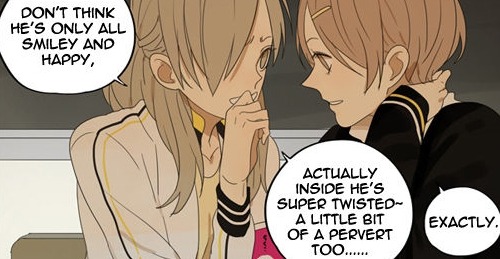
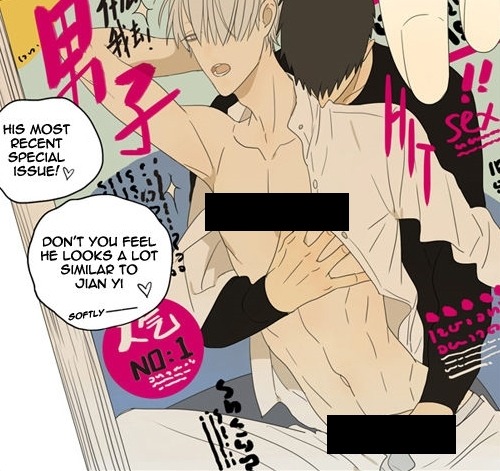
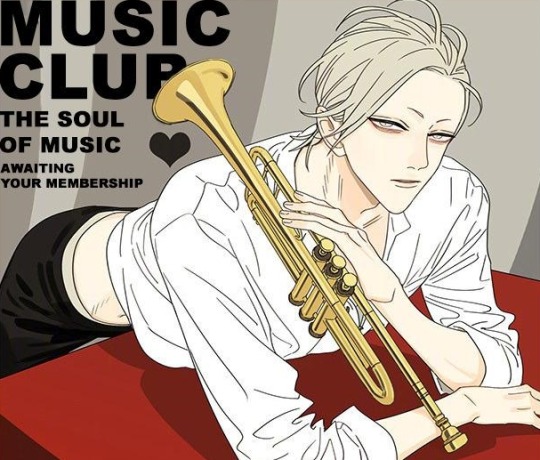
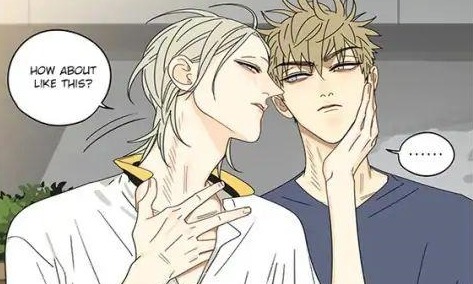
(Sorry for the cencor, but Tumblr wouldn’t let me post this otherwise...)
Those moments can basically be taken both as OX making light of the genre and the comic being self-aware. 19 Days makes funny metafictional references while also utilizing the BL conventions itself. It’s also a clever way if the author wants to take a stand on how their work is different from its predecessors in the same genre. Because I think 19 Days is quite one of a kind compared to other BL publications. And it has sparked conversations regarding the BL conventions, for example, ukes vs. semes. It can do all that and still be a BL as such that it appeals to females or fans of the genre in general.
Now, does any of that mean 19 Days can’t appeal to other kinds of fans, too? Of course, not! In fact, you yourself dear anon-san, are an excellent example of that. I think 19 Days is one of the few Asian BL comics that has attracted countless of Western fans, too, who are perhaps not that familiar with Asian BL. It should also be noted that m/m ships are hugely popular in the Western fandoms, too. They are just more tied to the original works and not really separated to become a genre of its own as has happened with BL in Asia, especially in Japan. As it happens, the stats of the Top 100 Ships on AO3 in 2019 were just published the other day, and whopping 69 of them are slash aka m/m. Do you think that is completely unrelated to the fact that fanfiction is mostly written and read by females? I’m not saying it’s the only reason because it’s more complicated than that, but it certainly indicates Western female audiences are also big fans of homoerotic content. And they, too, are often accused of “making everything gay”.
I also don’t have a problem admitting this: If 19 Days didn’t have homoerotic themes whatsoever and the boys were having crushes on females, I doubt I would have been interested in the comic. The other themes I mentioned above are interesting to me, but on their own and paired up with m/f endgame relationships they wouldn’t be enough for me. I don’t read 19 Days just for the gay content, but it is a significant reason why I originally checked it out and why I keep loving it. Personally, I don’t think being attracted to the gay aspect and loving the story and characters, too, has to be an either-or kind of deal. You can very well do both. Does saying this somehow make me less of a fan of 19 Days? I’m sure it does in some people’s eyes but frankly, I don’t need other’s approval to love and be interested in something.
So far, I have pretty much disagreed with everything you said, but allow me to offer you an olive branch, dear anon-san. I get why my BL-related notions may have upset you. I get where you are coming from with saying 19 Days isn’t a “fetish for women”. You don’t want something you love to be associated with something you clearly despise. Yaoi and fujoshis have a bad rep, and I’m not trying to pretend like it’s completely underserved. I read a lot of BL but don’t really agree with the hardcore fujoshi mentality or identify with them as a group. I also think BL works have many tropes and conventions that do not represent realistic gay relationships and are highly problematic. However, BL is a fictional genre with its own history, development, conventions, and target audience. And as an avid BL reader, I think just because something appeals to me in a fictional setting it doesn’t mean I’m advocating the same things in real life.
To be honest, talking about this kind of makes my stomach twist with dread and nerves because I realize many people might get upset over this. And putting yourself in this kind of position on Tumblr especially can be a bit risky. So, let me say it once again: People are welcome to disagree with me or think I’m as wrong as humanly possible. And I would most probably understand where they are coming from. However, I would also like to remind anyone feeling angry with me that this is just me coming from a different point of view. Just like you are, dear anon-san. As far as I’m concerned, you are free to enjoy 19 Days from your own perspective and me from mine without it having to mean we’re somehow robbing each other of something.
#19 days#answered ask#yeah i was kinda expecting to get at least one comment about this#i don't know if i have anything to add to this really#in case anyone wants to continue this conversation
146 notes
·
View notes
Text
@edward-mustbang good luck with your classes! College is hard now because of pandemic.
(´・ω・`)
Honestly, yeah...I think a lot of Antis are poorly read or they only know of the “major” problematic works like Lolita as being bad (b/c hey, everyone goes on and on about how it’s an unreliable narrator) and they can’t ever think of anyone writing fanfic to be transgressive or literary beyond “vague reference to the title/name of character.”
When stuff like Marquis De Sade (who is actually the namesake for sadism) and his “awful” (as in content) books+life are still offered, Lord Byron and his multitudes of offenses (guy was the equivalent to a sleazy rock star for the Brits back in the day; also had a brutal home life), Captive Prince (brutal look ar slavery and a commentary on POC in Australia), Circe (Madeline Miller’s book that ends in incest if you pay attention to how lineage works; absolutely fantastic work also).
I actually have a rather large collection of classics (western and eastern; like 300+) so it’s a rather touchy subject for me since I get flack for not being a sweet writer and it’s like...I take heavy inspiration from the stylings, ideas, and themes of older works.
It’s just the idea that no one would use fanfic to explore heavy topics in an actually “adult” manner that bothers me. It’s all “pedo fanfic” or “why is it so dark? :/“ and it’s like...did you analyze the themes and layers of it? I layer my works so heavily that I get comments from workshop that I need more footnotes or to be more “tell” than “show”. Like, that’s the sort of writer I am.
There’s just this whole “fear” of sexuality in the west while violence is “glorified” in some sense (IT, Antis’ gore blogs, fascination with guro, etc.). While there seems to be less “stigma” against it, the fandom portion, in like Japan (yeah, tooting my own horn and talkin’ out of my ass, but even a glance at the laws and the fan content that’s available shows the different in just fandom).
And you do have fanfics that get turned into books (Cassandra Clare and her Ron/Ginny incest fanfic that always get brought up for one example), so it’s like there’s this weird expectation that fanfics are both simultaneously not “real literature” but also “real literature (but only the stuff I like)” goin’ on.
There’s this expectation that fanfic is only supposed to be written for a “YA” audience and not for adults. That’s how I feel anyway. It feels like some Antis only read YA or maybe stuff like Song of Achilles (which while good, isn’t as “heavy” themed as Circe) if they want to broach adult fiction.
Basically almost word for word of this essay if I’m makin’ sense (“I don’t want to grow up and neither can you”). But maybe I’m tooting my ass again since it’s based on observation as someone who vaguely remembers like 2004/2005 fandom.
https://www.patreon.com/posts/25994657
Or that the darkness can only extend to physical violence, words, etc. and not to the emotions, the catharsis themselves.
You can’t touch adult subject matters as an adult would without “dumbing it down” or making a happy ending or going “it was bad!”
You can’t write as a “serious” (using that word loosely) writer with serious subjects. It has to be fun, loving, etc.
As a side note, my professor loved talkin’ about Lord Byron b/c he was so interesting yet awful. No actual professor worth their salt actually thinks like Antis do. Like...she literally has a PHD and saved someone’s grave from being destroyed b/c they were related to her favorite author and field of expertise so she’s not a “nobody” either.
And the other one talked about everything relating to the Odyssey including the violence, incest, etc. no professor thinks like Antis do and you’d be laughed out of class if you tried to do that shit and call for a ban. Or how the university library is filled with books on incest+violence+sex, databases that have articles on Twilight and “fandom” stuff, etc.
Or how workshop had people bringing in stories/poetry about murdered children, racism, a wife killing her abusive husband, suicide, sexual abuse, etc. everything “nasty.”
Like this is my field of choice. It’s not something I’m totally talkin’ out of my ass for when I speak on problematic.
#lord byron was hot#im sorry but im weak#i shouldnt have been on there#but back then you just lied about your age and knew what you were getting into
4 notes
·
View notes
Photo

📚 Drunk in Love (last thing I remember) by @lovehoperomance
He’s stumbling to the left of the street, hopeful that it’s in the direction of his flat, when he sees it. A food truck. Lit up in gold. It's as if God has taken a giant highlighter and drawn a halo around it. Okay, so it might be the streetlight shining down on it and the yellow light emanating from within...but Louis will still claim godly intervention if anyone asks.
He weaves across the pavement, shivering in what he now realises is a very brisk London evening, coated in fog.
“Hello. Hi.” Louis steps in front of the entire line, waving an aimless hand at the man in the truck who looks completely bewildered by Louis’ antics. The man is littered in tattoos and wearing a green headscarf that matches the sea foam of his eyes. “Do you have any fried chicken? Or a drink? Oh, oh, do you have chips? Oh please tell me you have chips?”
The man’s face, which Louis faintly registers is quite angular, shifts from bewilderment into a stunning, slightly crooked smile.
Or, the one where Louis wakes up, naked, in a stranger's bed and has no idea how he got there. Maybe it's foul play. Maybe it's just the kindness of a handsome stranger amused by his drunken antics.
🌹 Save A Horse, Ride A Cowboy by @chloehl10
Harry whimpered as Louis pushed himself up onto his tiptoes, grazing his ear lobe with his lips. His breath tickled Harry’s ears, and Harry swallowed, already anticipating what Louis was about to say.
“I’d like to ride you, cowboy…”
Or, Harry's a barman at Flaming Saddles, a country and western themed gay bar.
Louis’ a customer who’d like to see if the tall barman is as good on the ropes as everyone says he is...
📚 And That’s The Tea by @2tiedships2
I’d like an Earl Grey with milk and sugar, please.
Louis had the phrase memorized, even though it had disappeared off its place on his upper arm over thirteen years ago now.
At fourteen he didn’t understand. Soulmarks don’t just disappear. Not unless…
Unless one of them dies.
Or, the one where Louis loses his soulmate before even getting the chance to meet them, and he is in no way prepared for the kind of distraction his new friend Harry proves to be.
🌹 I’ll Fly Away by @vintage-harry
“Harold,” Louis spoke, but not too loud. He didn’t want to startle the cat pile.
“Louis? What are you doing home?” Harry greeted him with a toothy smile.
“Why are there three cats?” Louis pointed at the third one.
“That’s Hail. He’s so sweet.”
Louis blinked and shook his head slightly. “Why is he on the sofa, in the house, on the cats?”
“He lives here now,” Harry stated as if Louis should already be aware of this.
He was not aware of this news until now. “Since when?” He poked the cat in the head, his tiny black curtained head with white ears popped up. He mewed softly before blinking a few times.
Louis thinks he looked offended. He looked at Harry expectantly. Harry looked fond.
“For three days now.” He smiled at Louis. It reminded him of Dori smiling at Marlin in Finding Nemo.
Or, Louis and Harry live in a small town in Texas of just over 500 people and Harry seems to be growing cats in his garden. Love and fluff.
📚 Baby Honey 2.0 by @vintage-harry
A few weeks passed by and Louis had spent a large portion of his time with incognito mode on as he Googled ways to hint at pregnancies. He came up with a few ideas but was impatient and felt uncreative at any idea. The most he read about was for online announcements. Louis decided one day while he was at Niall’s with two kittens laying on his stomach to take a photo and post it. He knew Harry would see it pretty quickly as he had Louis’ Instagram notifications on.
Louis held his phone out and took a few shots of the sleeping kittens on his stomach, thumbed through them and found the one he liked best and posted it with the caption, “Three little kittens” he hit post and waited. It didn’t take long, ten minutes later Harry left a comment asking where the third kitten was. Louis rolled his eyes and deleted the photo.
Or, Louis is pregnant this time and tries to find creative ways to hint about it to Harry. Only it doesn’t go as planned.
🌹 fuck fake friends by @artxghoul
It’s better to just stay away. So he does. He tries his very best to.
It’s just weird when you can’t be happy for someone. When you can’t encourage their achievements anymore, because they did it alone or with someone else, when it was supposed to be with you.
Harry was supposed to always be with Louis.
Or, if you love someone, set them free. if they don't come back, text them when you're drunk.
📚 The Daddiest Place on Earth by @chloehl10
dilfs_atdisneyworld: Ooh he's popular. Is it me or has it got hot in here? #dilf #hothothot #gimme
louist91: What the hell? Why the fuck am I on a DILFs page again?"
dilfs_atdisneyworld: louist91, Hello! You're on here because you're a DILF. A dad I'd like to f...😜
Louist91: dilfs_atdisneyworld Oh my god. Fuck off mate.
Or, Louis. Harry. Instagram. A whole lot of confusion and a whole lot of laughs...
🌹 Harry Poppins by @jacaranda-bloom
When Louis’ best friends pass away he finds himself with an instant family. Maddie and Thomas are wonderful children but take an immediate dislike to every nanny that sets foot inside their house. After nanny number six is summarily dismissed Louis is at his wit’s end, that is until an unusual man arrives on their doorstep. Harry Styles is like nothing any of them have ever encountered before, and perhaps, exactly what they’ve been looking for all along.
📚 tonight’s not over (come over and stay) by @microlouis
Zayn doesn’t say anything for a moment, pausing and worrying at his bottom lip. Finally, he asks, “Have you heard that Cox guy is coming out with a new song?”
Louis freezes, fingers hovering over his keyboard where they had been typing his password.
“No, I hadn’t,” Louis says truthfully. “Where did you hear that?”
“Tell anyone this and I’ll kill you, but I’d consider myself a big fan,” Zayn says. His face doesn’t change in expression, completely serious as he admits this to Louis.
“Big fan? Like run a blog and everything?”
Or, harry is a famous singer and louis is a student who just wants to write his novel.
🌹 Fiction Romance by @rougeandtonic
Harry has a type.
He likes older, sophisticated, mature men. Well-educated men. Men with life experience and passion for arts and social causes. Men who are established in their careers, who've sorted their lives out.
Niall knows this.
And so Harry can't understand why he's sat here opposite Louis Tomlinson.
Or, a punk Louis/uni Harry blind date AU.
📚 Hope when the moment comes, you’ll say I did it all by SilverShadow1
Standing in front of them with an amused smile was an — there really was no other suitable word to describe him — angelic creature. Soft brown hair that was shaved on the sides and bright blue eyes that Harry had only seen in photos of the ocean; the lad was probably close in age to himself, yet seemed entirely boyish.
“Dad, put me down!” demanded Jess with no malice in her voice.
Harry looked down in surprise, forgetting that she was in his right arm.
“Oops,” he said, flushing. That caused the other lad to laugh.
“Hi,” said the man at the door.
Or, the one where Louis is a piano teacher and Harry and his daughter are goners for him.
🌹 Graphic design is my passion by @kingsofeverything
Graphic design student Louis Tomlinson has exams to study for and final art projects to complete, if it would stop raining long enough for him to walk across campus. Luckily Harry Styles has an umbrella, and he’s perfectly willing to share.
Louis doesn’t plan to get his heart broken and he doesn’t plan to make almost a hundred silicone dildos. One of these things definitely happens.
📚 i gotta get better! by @dystopianharry
Harry’s sex life has been pretty nonexistent since he broke up with his last non-soulmate boyfriend. after a chance encounter with someone online, he decides to enlist them to help him out. no strings attached, obviously.
Or, soulmates can feel each others’ pain and harry has some kinks he wants to explore.
🌹 Dreaming of You by @mizzwilde
The Begrudging Starbucks AU.
The world is winter and steamed milk and creamy espresso shots. The world is a never ending queue. The world is a Starbucks logo and a pink-cheeked smile from Niall and a bored scowl from Zayn and the world is Louis watching his best mate, Liam, fall in love with their newest customer, Harry. Who may or may not be in love with Louis. The world is cruel.
📚 Through a Mirror Dimly by @londonfoginacup
Louis Tomlinson, in his third year at university, does not expect nor want the roommate that is being assigned to his room.
Harry Styles, in his first year at university, has just been kicked out of one dorm and doesn't want to deal with yet another snobby, rich roommate.
They don't get along, and that's just how it is, until circumstances force them to reevaluate.
🌹 Raise a Glass to the Four of Us by @2tiedships2
Louis stared at his luggage.
Well. Apparently not his luggage, because the clothing he was looking at currently was a: worth more than everything he currently possessed, b: not his size at all, and c: more suited for a fancy ass lawyer than a holiday in NYC with his best mates.
“Ooh, nice loafers,” Niall said as he pulled one out of the suitcase. “I love the rainbows.”
“Okay,” Liam began. “What do you want to do first? Eat, shop for new clothes, or spend hours on the phone with the airline?”
Louis continued to stare at the luggage.
📚 His and Mine by @kissyboystyles
Harry is adopted by a wealthy family, soon to be cleared of his connection to his soulmate without discussion on his twentieth birthday-- a gruesome rite of passage. For the past eight years, Harry has been staring at one name: Louis. But what happens now that his heart starts fluttering for a stranger, helping him remain strong at his weakest points? Harry feels he should be cautious; what kind of person goes by the name Tomlinson anyway…
Or, Harry legally isn't supposed to meet his soulmate-- he's rendered physically unable to recognize him even if he did-- but yet, of course, he does.
🌹 Drop to Hold You by @becomeawendybird
After the end of the Second Wizarding War and the ensuing diplomacy between Muggles and the Wizarding world, the long-defunct Merlin College at Oxford opened it's doors again.
The ultra-competitive programs at Merlin require a rigorous application process. None more than the Auror training program. Louis finally manages to get in with his best friend Liam after a few false starts, only to be faced with the most beautiful, distracting man he could ever imagine.
📚 The Lone Hydrangea by @lightwoodsmagic
“Thank you again,” he smiled at Harry as he picked up the arrangement and headed towards the door, and Harry quickly realised he didn’t know the man’s name.
“I – wait! Sorry, I just...what’s your name?” At the man’s eyebrow raise, Harry stumbled over his words, “It’s just, if you’re coming back, I thought I should…know.”
As the man looked at Harry, his smile only grew, and Harry’s heart thumped in his chest.
“My name’s Louis. Louis Tomlinson, and it was so lovely to meet you,” he shot one final grin in Harry’s direction, “I’ll see you next week, Harry.” And then he was gone.
“It was lovely to meet you too,” Harry whispered to the empty shop, putting his head on the counter, “Louis”.
Or, the post Hogwarts AU where Harry's a florist, Louis' a muggle who edits fantasy books, and they both have no say in how quickly they fall for each other.
🌹 A Little Bit Like Fate by @28shadesofpink
“So,” Harry starts. “Since I heard you and your friend are not getting married, uhm... Would it be appropriate to ask you to stay for the kiss-in?”
“Really?” Louis says, light and playful. “And who would I be kissing?” He looks up and offers a sweet smile, perfectly innocent.
“Oh, I don’t know.” Harry is playing along, keeping his tone airy, but he takes a step forward and smirks. “With those cheekbones, I think you could kiss whoever you wanted.”
Or, Louis stumbles upon a kiss-in protest for LGBTQ rights, and he meets Harry. They click. It feels a little bit like fate.
📚 come together by @bottomlinsons
Harry and Louis slept together three weeks ago, and haven’t talked.
Their coming group project is gonna change that.
🌹 Seeing Blind by @that-idiot-overthere
Louis finally turns his head in Liam’s direction, knows his face is showing the longing he’s been aching with ever since it took root in his chest. “What the fuck do I do, Liam? He wouldn’t want me like that, but I want-” his voice cracks, and he turns his face back downwards. “What do you do when you’re not perfect for the person who’s perfect for you?”
Or, the one where Harry’s an independent omega who likes to have his fun and Louis is the blind alpha that changes Harry’s priorities.
📚 Sweet as Cherry Wine by @harrieberrie
Broken hearts are healed by the luck of the Irish
Or, Louis and Niall are a mess, Niall’s daughter has a hopeless crush, and Harry is hopelessly clueless
🌹 at the end of my rope by @saffona
"Baby?” Harry mumbles, voice laced with sleep and a shiver goes through Louis at hearing the term. He hasn’t called him that in so long, in that voice and, clearly, even Louis’ body fucking misses it.
“Did you cheat on me?” Louis finds himself asking. If he’s being honest it’s more so he can see Harry’s reaction, than a genuine question, but what has he got to lose?
Sure enough, Harry’s face changes from sleepy to the most incredulous look Louis’ ever seen on him. He actually looks terrified, all wide eyes, mouth gaping like he can’t believe Louis would even assume that and Louis would laugh at it, but he’s so done with the way Harry’s been acting, he just wants to know what the hell’s going on.
Or, the one where they go to Crete and Harry is definitely hiding something.
📚 truth, justice, and the gay way by @hattalove
Liam needs a costume. Louis needs a best best friend award, a holiday, and to get a grip.
(Harry’s just in the right place at the right time.)
🌹 Hello My Name Is Harry by @a-brighter-yellow
Louis’s 20-year high school reunion takes a turn when a celebrity classmate – who also happens to be Louis’s long unrequited crush – unexpectedly shows up.
A famous/not-famous AU inspired by Chris Evans.
[Previous Monthly Recs]
158 notes
·
View notes
Text
June 2020 Reads - Minireviews
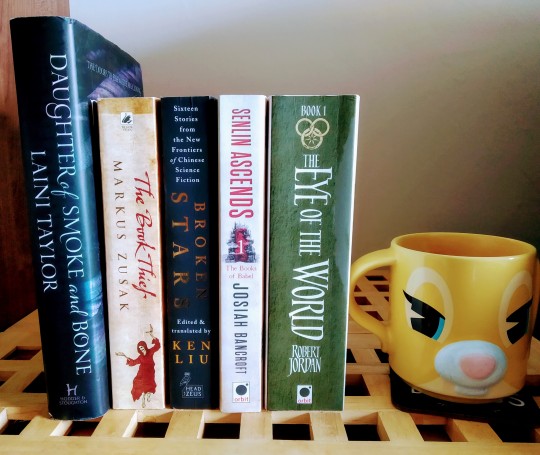
5 books this month, including a BIG one. June was a bit slower; I am still not back in work and the weather was pretty terrible, so I didn’t get out much. Lockdown rules have been relaxed a bit, so we’ve had a few friends round that we haven’t seen since Feb. Was nice to just have a few drinks and play some card games (Exciting!). Now, to the mini-reviews!
The Eye of the World (Robert Jordan) I wasn’t planning on reading this, but one of my friends has been telling me to read it for years now. I’ve heard all the “it’s just LOTR fan fic/rip-off”, so I put it off since there’s always so much more original content on my reading list. Then I randomly found it in a charity shop for £2. I took it as a sign that I should read it, and I’m really glad I did! A group of young lads discover that they are being targeted by some very scary and dangerous folk, and set off on a quest with a warrior and a powerful female warrior-mage to find out why the forces of darkness are rising and why they are so interested in them. Are there a ton of LOTR parallels? Yes. Does it feel like Robert Jordan just wanted to be a modern-day Tolkien? Yup. But did I care? No. I recently started reading The Lord of the Rings (I reviewed The Fellowship of the Ring a few months ago), and god damn is that shit a slog. It took me MONTHS to read The Fellowship. I think the only way I could sum up The Fellowship is “dense, whilst simultaneously lacking in detail”. I finished TEOTW in exactly 2 weeks, and while it is dense, the story flowed well, most of the characters are interesting, there’s some badass ladies and there’s enough genuinely well-developed mystery surrounding the characters that I’m very keen to keep reading (although 14 x 800 page books is a lot of reading time to devote to one series, but we’ll see how it goes!). So, was TEOTW special or unique? Nope, but I found it an easy and entertaining read despite its size, and it was different enough from LOTR to keep me interested. Very good. 4/5
Broken Stars: Contemporary Chinese Science Fiction in Translation (Translated by Ken Liu) I’ve already used a bit of my blog to wax lyrical about how great Ken Liu is. And I’m going to do it again! He’s great! What a guy! In this follow up to Invisible Planets, Ken has picked 16 more short sci-fi stories (and some with fantasy elements) written by some wonderful Chinese authors and again translated them for English speakers. This is just as strong a collection of stories as the ones picked for Invisible Planets and just as varied in their ideas and themes. Particular highlights include Baoshu’s What Has Passed Shall in Kinder Light Appear which is a kind of historical fiction where time for the characters progresses linearly, but major world events such as the Second World War and the Chinese Cultural Revolution are happening in reverse. This instalment also includes some more fun stories, such as Fei Dao’s The Robot Who Liked To Tell Tall Tales which is a really cute story about a King known as the biggest bullshitter in the kingdom, but doesn’t want to die with that reputation, so sends a robot out into the world with the mission to become a bigger bullshitter than the King. And finally, Ma Boyong’s The First Emperor’s Games is a short and fun read that will delight anyone with an interest in video games. I enjoyed every minute of this book and hope Ken will continue to bring Chinese sci-fi to western readers. 5/5
Daughter of Smoke and Bone (Laini Taylor) This was another charity shop find (50p!). Looked like fantasy (judging book by its cover, I know!) and then saw that Patrick Rothfuss had given it a glowing review. Turns out it was well deserved. Karou is an art student studying in Prague and seems relatively normal to her friends. However, she moonlights as an assistant to demonic beings who brought her up after she was orphaned, collecting teeth for a purpose she does not yet know. After a chance encounter with an angel, she finally finds out the truth. This is a beautifully written book. The writing is so visual, and it was extremely easy to picture the characters and their surroundings. The way the author describes Prague made me want to jump on the next plane and go. If I were any good at drawing, I would probably have had a go at creating some fan art. My only gripe would be that I’m not a fan of over-the-top, unobtainable, supernatural type romance, and the last half of this book is exactly that. However, once you start to realise what an important element this is to story, you do start to forgive it. Fast-paced and beautifully written. 4/5
The Book Thief (Markus Zusak) I don’t read a lot of historical fiction, so this was different for me. Since I mainly read fantasy, there’s always a certain “epic-ness” to everything I read. The Book Thief is not epic, but that doesn’t detract from this beautiful story based on some of the most tragic events of the last 100 years. The story follows Liesel, a young girl who is forced to live with foster parents after her own are taken to a Nazi concentration camp during WW2 for being identified as communists. This is a story of her growing up in a poor town just outside Munich and the stories of the people she meets along the way (and her growing obsession with stealing books). But to give it a bit of quirkiness, the story is narrated by Death himself. This was probably my favourite aspect of this story, as it gave an “alternative” view of Death. Death is extremely thoughtful and talks in a manner of helping people “cross-over”. I imagine that the author didn’t have the stereotypical black cloak and scythe combo that we usually picture Death to look like. The vast array of characters makes this book an endearing one and it is one I will not soon forget. 4/5
Senlin Ascends (Josiah Bancroft) I would have to put this into my most unexpected reads category. I’m finding it hard to compare to anything. Thomas Senlin is a school headmaster and all-round fuddy-duddy. He keeps to himself and never gets into any trouble. When he eventually marries Marya, a beautiful, fun, and upstanding young woman, eyebrows are raised. They decide to spend their honeymoon visiting The Tower of Babel, a marvel of modern-day engineering with unique societies on every floor. A tower so tall, no one can see the top and no one can actually confirm how high it is. Senlin has learned everything he knows about The Tower of Babel from a visitor’s guide that describes it as a utopia; the pinnacle of modern and civilised society. However, when they arrive Senlin immediately loses Marya in the dense crowds just outside the tower and he quickly learns that this place is as far from utopia as it gets. This is extremely unique science fiction with steampunk elements throughout, and follows the change in Senlin’s personality and outlook as he ascends through the tower, desperately trying to find his wife. I will admit to feeling a bit deflated about this book about halfway through. The lack of strong and/or independent female characters had me worrying and it seemed to be turning into a “save the damsel in distress story”. However, I was breathing a sigh of relief as I approached the conclusion of the book. Not every female character was a victim! Phew! Overall, a great start to this series and I’m looking forward to reading the second book. 4/5
#book review#june books#reading goals#book blog#read more#booklr#bookblr#bookblogger#fantasy fiction#science fiction#Chinese science fiction
1 note
·
View note
Text
Sci-Fi And The Sincerest Form Of Flattery
I know many of you prefer “science fiction” or “science fantasy” or “speculative fiction” or “sf” or even “stf” for short, but I ain’t that guy…
I’m a sci-fi kinda guy.
I prefer sci-fi because to me it evokes the nerdy playfulness the genre should embrace at some level (and, no we’re not gonna debate geek vs nerd as a descriptor; “geeky” implies biting heads off chickens no matter how benign and respectable the root has become).
. . .
A brief history of sci-fi films -- a very brief history.
Georges Melies’ 1898 short A Trip to The Moon is one of the earliest examples of the genre, and it arrived full blown at the dawn of cinema via its literary predecessors in Verne and Wells.
There were a lot of bona fide sci-fi films before WWII -- the Danes made a surprisingly large number in the silent era, Fritz Lang gave us Metropolis and Frau Im Mond, we saw the goofiness of Just Imagine and the spectacle of Things To Come and the space opera appeal of Flash Gordon and Buck Rogers.
And that’s not counting hundreds of other productions -- comedies and contemporary thrillers and westerns -- where a super-science mcguffin played a key part.
That came to a screeching halt in WWII primarily due to budget considerations and real world science easily overtaking screen fantasy. Still, there were a few bona fide sci-fi films and serials during the war and immediately thereafter, but it wasn’t until the flying saucer scare of the late forties that sci-fi became a popular movie genre again (and on TV as well).
Ground zero for 1950s sci-fi was George Pal’s Destination Moon, which was an attempt to show a plausible flight to the moon (it was actually beaten to the screens by a couple of other low budget movies that rushed into production to catch Pal’s PR wave for his film).
This led to the first 1950s sci-fi boom that lasted from 1949 to 1954, followed by a brief fallow period, then a larger but far less innovative second boom in the late 1950s to early 1960s.
BTW, let me heartily recommend the late Bill Warren’s magnificent overview of sci-fi films of that era, Keep Watching The Skies, a must have in any sci-fi film fan’s library.
Seriously, go get it.
Bill and I frequently discussed films of that and subsequent eras, and Bill agreed with my assessment of the difference between 1950s sci-fi and 1960s sci-fi: 1950s sci-fi most typically ends with the old order restored, while 1960s sci-fi typically ends with the realization things have changed irrevocably.
In other words,
“What now,
puny human?”
I judge the 1960s sci-fi boom to have started in 1963 (at least for the US and western Europe; behind the Iron Curtain they were already ahead of us) with the Outer Limits TV show, followed in 1964 by the films The Last Man On Earth (based on Richard Matheson’s I Am Legend), Robinson Crusoe On Mars, and The Time Travelers.
But what really triggered the 1960s sci-fi boom was Planet Of The Apes and 2001: A Space Odyssey. The former was shopped around every major Hollywood studio starting in 1963 until it finally found a home at 20th Century Fox (whose market research indicated there was an audience for well-made serious sci-fi film and hence put Fantastic Voyage into production). Kubrick, fresh off Lolita and Dr. Srangelove (another sci-fi film tho not presented as such), carried an enormous cache in Hollywood of that era, and if MGM was going to bankroll his big budget space movie, hey, maybe there was something to this genre after all.
From 1965 forward, the cinematic space race was on, with 1968 being a banner year for groundbreaking sci-fi movies: 2001: A Space Odyssey, Barbarella, Charly, Planet Of The Apes, The Power, Project X, and Wild In The Streets. (Star Trek premiering on TV in 1967 didn’t hurt, either.)
And, yeah, there were a number of duds and more than a few old school throwbacks during this era, but the point is the most interesting films were the most innovative ones.
Here’s a partial list of the most innovative sci-fi films from 1969 to 1977, nine-year period with some of the most original ideas ever presented in sci-fi films. Not all of these were box office successes, but damn, they got people’s attention in both the film making and sci-fi fandom communities.
=1969=
The Bed Sitting Room
Doppelganger (US title: Journey To The Far Side Of The Sun)
The Gladiators
The Monitors
Stereo
=1970=
Beneath The Planet Of The Apes [a]
Colossus: The Forbin Project
Crimes Of The Future
Gas-s-s-s
The Mind Of Mr. Soames
No Blade Of Grass
=1971=
The Andromeda Strain
A Clockwork Orange
Glen And Randa
The Hellstrom Chronicle
THX 1138
=1972=
Silent Running
Slaughterhouse Five
Solaris [b]
Z.P.G.
=1973=
Day Of The Dolphin
Fantastic Planet
The Final Programme (US title: The Last Days Of Man On Earth)
Idaho Transfer
=1974=
Dark Star
Phase IV
Space Is The Place
Zardoz
=1975=
A Boy And His Dog
Black Moon
Death Race 2000
Rollerball
Shivers (a.k.a. They Came From Within and The Parasite Murders) [c]
The Stepford Wives
=1976=
God Told Me To [a.k.a. Demon]
The Man Who Fell To Earth
=1977=
Wizards
[a] I include Beneath The Planet Of The Apes because it is the single most nihilistic major studio film released, a movie that posits Charlton Heston blowing up the entire planet is A Damn Good Idea; follow up films in the series took a far more conventional approach to the material. While successful, neither the studio nor mainstream audiences knew what to make of this film, so 20th Century Fox re-released it in a double bill with another problematic production, Russ Meyer’s Beyond The Valley Of The Dolls, and holy cow, if ever there was a more bugfuck double feature from a major studio I challenge you to name it.
[b] Other than Karel Zemen’s delightful animated films, Iron Curtain sci-fi films rarely screened in the US, with the exception of special effects stock shots strip mined to add production values to cheapjack American productions (looking at you, Roger Corman). Solaris is the exception.
[c] David Cronenberg made several other films in this time frame, but most of them were variations on the themes he used in Shivers, including his big break out, Scanners. Realizing he was repeating himself, Cronenberg reevaluated his goals and started making films with greater variety of theme and subject matter.
. . .
The astute reader will notice I bring my list to an end in 1977, a mere nine-year span instead of a full decade.
That’s because 1977 also saw the release of Close Encounters Of The Third Kind and Star Wars.
The effect was immediate, with knock-off films being released the same year.
1978 saw Dawn Of The Dead, a sequel to 1968’s Night Of The Living Dead, and Superman, the first non-campy superhero movie aimed at non-juvenile audiences.
1979 gave us Alien, Mad Max, and Star Trek: The Motion Picture.
These films were not just successful, they were blockbusters.
And none of them were original.
Close Encounters served as an excuse to do a Kubrick-style light show; plot and theme are about as deep as a Dixie cup, and of all the blockbusters of that era, it’s the one with no legs.
Alien’s pedigree can be traced back to It! Terror From Beyond Space (and It’s pedigree goes back to A.E. van Vogt’s “Black Destroyer” and “Discord In Scarlet” in the old Astounding Stories) and Demon Planet (US title: Planet Of The Vampires) by way of Dark Star (Dan O’Bannon writing the original screenplays for that film and Alien as well).
Mad Max, like 1981’s Escape From New York, differs from earlier post-apocalypse movies only insofar as their apocalypses of a social / cultural / political nature, not nuclear or biological weapons. Mad Max, in fact, can trace its lineage back to No Blade Of Grass, which featured it own caravan of refugees attacked by modern day visigoths on motorcycles, and the original Death Race 2000, as well as an odd little Australian non-sci-fi film, The Cars That Ate Paris.
Not only was Dawn Of The Dead a sequel, but it kickstarted a worldwide tsunami of zombie movies that continues to this day (no surprise as zombie films are easy to produce compared to other films listed here, and while there are a few big budget examples of the genre, the typical zombie movie is just actors in ragged clothes and crappy make-up).
Superman was…well…Superman. And Star Trek was Star Trek.
And the granddaddy of them all, Star Wars, was a cinematic throwback that threw so far back it made the old seem new again.
Not begrudging any of those films their success:
They were well made and entertaining.
But while there had been plenty of sequels and remakes and plain ol’ knockoffs of successful sci-fi movies in the past, after these seven there was precious little room for anything really different or innovative.
1982’s E.T. was Spielberg’s unofficial follow-up to Close Encounters.
1984’s Terminator consciously harkened back to Harlan Elison’s Outer Limits episodes “Demon With A Glass Hand” and “Soldier” (not to mention 1966’s Cyborg 2087 which looks like a first draft of Cameron’s film)
All innovative movies are risky, and the mammoth success of the films cited above did little to encourage new ideas in sci-fi films but rather attempts to shoehorn material into one of several pre-existing genres.
Star Wars = space opera of the splashy Flash Gordon variety
Star Trek = crew on a mission (Star Trek: The Next Generation [+ 5 other series], Andromeda, Battlestar: Galactica [4 series], Buck Rogers In The 25th Century, Farscape, Firefly [+ movie], The Orville, Space Academy, Space Rangers, Space: Above And Beyond, plus more anime and syndicated shows than you can shake a stick at)
Superman = superheroes (nuff’ sed!)
Close Encounters / E.T. = cute aliens
Alien = not-so-cute aliens
Terminator = robots vs humans (and, yes, The Matrix movies fall into this category)
Escape From New York = urban post-apocalypse
Mad Max = vehicular post-apocalypse
Dawn Of The Dead = zombies
Mix and match ‘em and you’ve got a nearly limitless number of variations you know are based on proven popular concepts, none of that risky original stuff.
Small wonder that despite the huge number of new sci-fi films and programs available, little of it is memorable.
. . .
It shouldn’t be like this.
With ultra-cheap film making tools (there are theatrically released films shot on iPhones so there’s literally no barrier to entry) and copious venues for ultra-low / no-budget film makers to show their work (YouTube, Vimeo, Amazon Prime, etc.), there’s no excuse for there not to be a near limitless number of innovative films in all genres.
But there isn’t.
I watch a lot of independent features and short films on various channels and streaming services.
They’re either direct knock-offs of current big budget blockbusters (because often the film makers are hoping to impress the big studios into giving them lots of money to make one of their movies), or worse still, deliberately “bad” imitations of 1950s B-movies (and I get why there’s an appeal to do a bad version of a B-movie; if you screw up you can always say you did it deliberately).
Look, I understand the appeal of fan fic, written or filmed.
And I get it that sometimes it’s easier to do a knock-off where the conventions of the genre help with the final execution.
But let’s not make deliberate crap, okay?
Oscar Wilde is quoted as saying “Imitation is the sincerest form of flattery” but he was quoting somebody else, and that wasn’t the whole original quote.
Wilde was quoting Charles Caleb Colton, a dissolute English clergyman with a passion for gambling and a talent for bon mots.
Colton’s full quote:
“Imitation is the sincerest form of flattery that mediocrity can pay to greatness.”
Don’t be mediocre.
Be great.
© Buzz Dixon
5 notes
·
View notes
Text
Anime and Animation Recommendations (Includes shows I would never recommend, please read the accompanying text)
Fullmetal Alchemist Brotherhood: I feel like this is what would happen if the album Clockwork Angels by Rush was turned into anime, but the main character was replaced by two brothers who actually have a personality and an interesting backstory. Essentially, it is a mix of a compelling take on western philosophy from an eastern perspective, good character writing, and FANTASTIC art direction. Characters undergo meaningful development, it has no filler, and it avoids the problem of power creep fairly well. Adding to that its heavy use of Sakuga an minimalist animation, and it is one of my favorite anime of all time.
Mob Psycho 100: Criminally underrated. With a plot borrowed from a japanese web-comic maker who is surprisingly good at making comedy and relatable themes meld seamlessly, and animated by Studio Bones which is basically my favorite studio, this show is absolutely fantastic, to the point at which it competes with ol’ Fullmetal for my favorite anime. Like its sister anime One Punch Man, this show uses VERY heavy use of both Sakuga and minimalist styles of animation, switching between them in a way that is hardly noticeable but also really captures the feel of the situation; it even switches art styles regularly, and the animators are not afraid to try new things, making the show an absolute blast to watch. Despite its comedy focus, the main characters undergo extensive development, sometimes in the span of a single episode, and the combat sections are mesmerizing to look at.
One Punch Man: Really good show, slightly overrated, but mostly deserving of the attention it gets. As someone who was unemployed for a long time, this show really captures the difficulties of someone in that situation. The plot, such as it is, is pretty repetitive by it’s very nature, but it’s animated by Mad House studios, and is basically composed entirely of Sakuga with short spurts of minimalist animation to remind one of the original web comic (you may notice a theme in the anime I like), making it a blast to watch. Would recommend.
Hero Academia: The Naruto of our generation, and it’s easy to see why it’s so popular. The character designs and personalities are all memorable (such that you can actually remember all their names), and basically all of the main cast gets at least some screen time; as a result, it is really easy to remember basically everyone’s names. Because of the memorable character designs, it is no surprise that the fandom is bursting at the seams with shippers, but for the most part it’s non-toxic and results in a lot of pretty good fan art. And of course, as you guessed, it has Sakuga, and makes good use of it. Finally, as an aside, it has one of the best portrayals of a paragon archetype character I have seen in a long time, in the form of All Might. Would recommend, but I really don’t have to because it’s all over the place.
Guerren Lagann: Good animation, good character designs, stupid nonsensical plot. A really fun anime if you turn your brain completely off and just watch the GIANT ROBOT FIGHTS.
Kill la Kill: Good animation, but I can’t stand the character designs and the plot is so physically painful I couldn’t watch past the fourth episode (I only watched in the first place because some idiot on youtube said it had interesting themes, which it does not). Do not recommend.
Mobile Suit Gundam: The 08th MS Team: Good anime, but the fanservice is too much for me. Just as I was getting invested in the plot (a treatment of the Gundam war from the perspective of the grunts on the surface), BOOM NAKED BOOBS HERE. No seriously, it came out out of nowhere so suddenly it gave me a heart attack. Mixed feelings on this anime.
Death Note: Good anime. A little melodramatic. I love L, ‘cause he’s basically me but smarter. Would recommend.
Bleach: SO MUCH POTENTIAL WASTED. Season 1 was GREAT, season 2 was ok, and then I couldn’t get past the Bount arc. Would recommend for the sake of the first two seasons.
Attack on Titan: two words: CRIMINALLY OVERRATED. It’s basically edgy trash with little depth or nuance, and a plot that seems ripped from Starship Troopers.
Assassination Classroom: Really good, actually. Well animated, decent character designs, a little weak on character development. Korosensei is my spirit animal (I’m a teacher). Goodness gracious, he embodies everything I want to be in terms of being a teacher, except perhaps his obsession with big boobs. Would recommend.
Psycho-Pass: Very cerebral, very interesting, very mesmerizing, has complex themes. Only downsides are that it’s basically a torture porn during the entire first half of the first season, which means you don’t want to eat before you watch it, and really only the main two protagonists and the main villain have good character designs. Would recommend for those who don’t mind seeing a lot of mutilated bodies and who like complex themes.
Now for shows that look like anime:
Avatar the Last Airbender: No surprise, this is a really good show. Minimal filler, and what filler there is doesn’t feel like filler. Good action, excellent handling of complex themes, good magic system. The plot starts out okay and then ramps up significantly after the season one finale. Where this show really shines, though, is it’s characters, who are almost all memorable and have great voice acting. Better yet, almost all of them get character development. Also a good exploration of eastern philosophy. Would recommend to those three people who haven’t seen it yet.
Legend of Korra: Good action, good art direction, really good animation. Not sure I like most of the characters, though. to be honest, Varrick, Zhu Li, Bumi, and Bo Lin are the only protagonists who I like in this show, besides of course the returning caste from the previous show. Season two was pretty bad, but the plot was very strong for seasons 1, 3, and 4. Some things felt very shoehorned. Almost all the villains were so incredibly compelling that they almost made up for the bland protagonists, and each one represented an individual theme, which was a very nice touch. Kinda screwed up some of the lore and the magic system, though. Mixed feelings on this one.
Dragon Prince: Season 1 was good, introduced a really cool magic system, nice complex themes, and a diverse and likable cast. The down side was that it suffered from some... questionable choices in animation style. Season 2, on the other hand, is... just really, really, really good. It has a good chance of becoming the next Avatar the Last Airbender if it keeps this up. It explores the magic system in fascinating detail, the themes are developed with a depth that rivals that of Korra, the plot has thickened, and the characters have developed significantly in likability and relatability. I highly recommend this one.
Voltron Legedary Defender: Starts out really good with Sakuga all around, kick-ass action scenes, and a decent plot. Unfortunately the shippers infested the fandom to the point where they were actually influencing the direction of the show, and the plot suffered as a result. Over the course of eight season, the show slowly decayed into a hollow shell. Mixed feelings on this one.
Ben 10: Kinda overrated, but still good. A nice watch on day you just want to relax and watch well-animated fights, but don’t expect it to make much sense.
Generator Rex: Criminally underrated. I love all the characters, all the action is great (even if it doesn’t make sense sometimes), animation is pretty good throughout, and it actually has really good technobabble. Honestly, it is my favorite show out of all of the ones on the list, despite its problems, just because of the really cool aesthetic. The main character starts as an obnoxious stereotypical Cartoon Network Protagonist, and develops into my second-favorite depiction of a paragon archetype. All the villains are memorable (even the silly ones). The first season has the best stand-alones (with some absolutely hilarious comedy episodes, dark edgy episodes, and fascinating pieces of science fiction); the second season has a season finale so good it made me cry, and the third season has by far the most interesting plot. I have a recommended watch order if you want to watch it.
Samurai Jack: Minimalist, very stylized, has some kick-ass fight sequences. Each episode has it’s own plot with not much in terms of overlap, but even the minor characters are memorable. My favorite is the Scotsman, but that is really no surprise if you watch the show. The Yin Yang dynamic between Jack and Aku is really interesting in its own right. Would highly recommend.
Teen Titans: Starts out mediocre, quickly gets good by the end of the first season, then ramps up to amazing by whichever season had the Trigon arc. Characters are almost as instantly recognizable as those in Hero Academia, and each one gets character development. It also has some standalone episodes that are almost as good as the standalones in Generator Rex. YOU SHOULD WATCH THIS SHOW.
Young Justice: Very similar to Generator Rex in many way. Memorable characters with good character development, good sci-fi, good action, and a similar season structure. It’s having a new third season right now which, despite the drop in animation quality due to limited funds, still manages to be engaging (especially the Vandal Savage origin episode and the three-episode arc devoted to Cyborg’s origin). Would recommend.
Transformers Animated: Criminally underrated, largely because of its... different animation style which is more like the animation for Teen Titans than the original G1 series, and the fact that they changed a lot of the lore. It has surprisingly complex themes, the voice acting is spot-on, and they do a good job of handling power creep. Though many of the protagonists start out kind of unlikable, they get really good development as the series goes on. By season 3, every single character has become so likable that it becomes legitimately distressing when they get hurt, and they play it to good effect. To give you an idea, when my sister saw the season finale of this show, she had an enormous melt-down at the end when her favorite character died (not telling who). It took three days to calm her down (the only way to do so was to introduce her to the idea of fan-fiction. I HIGHLY recommend this show.
#fullmetal alchemsit brotherhood#anime#young justice#dragon prince#generator rex#my hero academia#mob psycho 100#transformers#samurai jack
84 notes
·
View notes